Zoning Bylaw No. 12375
Section 5 - Definitions and Interpretations

5.1.1 Words used in the present tense include the other tenses and derivative forms; words used in the singular include the plural and vice versa; and the word "person" includes a corporation, firm, partnerships, trusts, and other similar entities as well as an individual. Words have the same meaning whether they are capitalized or not.
5.1.2 The words "shall" and "is" require mandatory compliance except where a variance has been granted pursuant to the Local Government Act.
5.1.3 The phrase "used for" includes "arranged for", "designed for", "maintained for", or "occupied for".
5.1.4 Words, phrases, and terms defined neither in this section nor in the Local Government Act shall be given their usual and customary meaning.
5.2.1 The zone boundaries on the Zoning Map shall be interpreted as follows:
- where a zone boundary follows a street, lane, railway, pipeline, power line, utility right-of-way, or easement, it follows the centreline of the right-of-way or easement, unless otherwise clearly indicated on the Zoning Map;
- where a zone boundary is shown as approximately following the City boundary, it follows the City boundary;
- where a zone boundary is shown as approximately following the edge, shoreline, or high-water mark of a river, lake, or other water body, it follows that line. In the event of change, it moves with the edge or shoreline;
- where a zone boundary is shown as approximately following a lot line, it follows the lot line;
- where a zone boundary is shown as approximately following a topographic contour line or a top of bank line, it follows that line;
- where a zone boundary is shown as being generally parallel to or as an extension of any of the features listed above, it shall be so; and
- in circumstances not covered above, the zone boundary shall be determined by the scale of the Zoning Map.
5.2.2 When any street is closed, the land is deemed to have the same zoning as the abutting land. When abutting lands are governed by different zones, the centreline of the previous right-of-way is the zone boundary unless the zone boundary is shown following the edge of the right-of-way. If the right-of-way is consolidated with an adjoining parcel, the parcel’s zoning designation applies to the consolidated portion.
5.3.1 The definitions of uses group individual land uses into a specified number of classes, with common functional or physical impact characteristics. They define the range of uses which are principal and secondary, with or without conditions, within various zones of this Bylaw.
5.3.2 The following guidelines shall be applied in interpreting the use class definitions:
- typical uses listed in the definitions as examples are not intended to be exclusive or restrictive; and
- where a specific use does not conform to the wording of any use class definition or generally conforms to the wording of two or more definitions, the use conforms to and is included in that use class which is most appropriate in character and purpose.
5.3.3 The following words, terms, and phrases, wherever they occur in this Bylaw, shall have the meaning assigned to them as follows:
ABUT or ABUTTING means immediately contiguous to, or physically touching, and when used with respect to lots or sites means two that share a common lot line.
ACCESSORY BUILDING OR STRUCTURE means a separate building or structure that may be connected to the principal building by a breezeway, normally ancillary, incidental, subordinate, and located on the same lot as the main building or structure. Typical accessory structures include but are not limited to antennae, propane tanks, satellite dishes, flagpoles, garages, and garden sheds. This category of buildings and structures do not apply to agricultural structures or to temporary farm worker housing.
See Section 6.9 for further accessory building regulations.
ADJACENT means land that abuts and is contiguous to a site, and also includes land that would be contiguous if not for a street, lane, walkway, stream, utility lot, underground pipeline, power line, drainage ditch, watercourse, or similar feature.
AGRICULTURAL ANIMAL UNIT is equivalent to a live farm animal weight corresponding to 455 kilograms (1000 pounds) for livestock, poultry, or any combination of them equaling 455 kilograms.
AGRICULTURAL BY-PRODUCT means a by-product of agriculture and includes manure, used mushroom medium and agricultural vegetation waste. A full list of agricultural by-products is listed within the Environmental Management Act under the Code of Practice for Agricultural Environmental Management.
AGRICULTURAL LAND COMMISSION (ALC) means the autonomous, administrative tribunal, independent of the provincial government, that is responsible for administering the Agricultural Land Commission Act and its regulations which relate to the preservation of agricultural land.
AGRICULTURAL LAND RESERVE (ALR) means land, including Crown Land, that has been defined as being suitable for farm use, and has been designated for preservation under the provisions of the Agricultural Land Commission Act.
AGRICULTURAL STRUCTURES are those buildings or structures used for agriculture or agriculture, intensive. Section 10.3 Permitted Land Uses for agricultural and rural residential zones outlines different agricultural related land uses and Section 10.5 – A1 Agricultural and Development Regulations outlines various setbacks, heights, site coverage, and gross floor area limits for agricultural structures and various agricultural related structures.
AGRICULTURE means development or use of land for the growing of crops or the production of farm products. Parcels within the ALR shall be inclusive of any farm use as identified by the ALC.
AGRICULTURE, INTENSIVE means the use of land, buildings and structures by a commercial enterprise or an institution for:
- the confinement of poultry, livestock (excluding horses), or fur bearing animals.
- the growing of mushrooms, including significant composting.
AGRICULTURE, URBAN means the cultivation of a portion of a lot for the production of food including fruits, vegetables, nuts, and herbs for human consumption only. Activities that produce or emit hazards, odour, dust, smoke, noise, effluent, light pollution, glare, or other emission are prohibited. This definition does not include poultry and/or livestock. Community gardens are permitted wherever agricultural, urban is permitted but must follow the specific regulations identified in Section 9.6 Agriculture, Urban.
AGRI-TOURISM means the use of land for any agri-tourism activity defined under the Agricultural Land Commission Act and related regulation or policy. This land use excludes agri-tourist accommodations.
AIRCRAFT SALES/RENTALS means the sale, charter, or rental of aircraft together with incidental maintenance services, and the sale of parts and accessories.
AIRPORTS means any area designed, prepared, equipped, or set aside for the arrival, departure, movement, or servicing of aircraft; and includes any associated buildings, installations, hangars, open space, accessory parking and equipment in connection therewith. This also includes aircraft and airport related manufacturing and services.
ALCOHOL PRODUCTION FACILITIES means the production of alcoholic beverages or alcohol products with alcoholic content exceeding 1% by volume. The public tasting and retail sale of alcoholic product is limited to that which is produced on-site. This public tasting and retail sale limit can be expanded for properties within the ALR as permitted by ALC’s regulations and polices.
ALTERATION OF LAND means, but is not necessarily limited to: soil relocation due to building or parking lot construction or alteration; removal, alteration, disruption or destruction of vegetation; soil removal or filling; construction or alteration of retaining walls, patios, lawns, agricultural activity or any structural change to a building or structure that results in an increase or decrease in the area or volume of the building or structure; a change in the area, frontage, depth, or width of a lot that affects the required yard, landscaped open space, or parking requirements under this Bylaw; or discontinuance or change, where the new use is differently defined as the original use, in the principal use of the lot, building, or structure.
ALTERNATIVE FUEL INFRASTRUCTURE means any one of the following:
- Direct Current Fast Charger (DCFC), or its equivalent; and /or
- Hydrogen vehicle refueling station.
ANCILLARY means subordinate or assisting and in the case of a building or structure, would include essential structural components necessary to the building function such as mechanical penthouses, elevator housing, mechanical rooms, communication structures, or chimneys.
ANIMAL CLINICS, MAJOR means those premises where animals are given medical and surgical care and may include outdoor shelter. This use also includes animal clinics, minor as well as animal shelters used for the temporary care of lost, abandoned, or neglected animals.
ANIMAL CLINICS, MINOR means those premises where domestic pets, animals and birds are treated inside a building and kept for medical or surgical purposes and are directly or indirectly under the care of a veterinarian. This use also includes animal grooming, training, and day-care, but does not include an animal shelter. Animals are to be kept overnight only when required for medical supervision.
APARTMENT HOUSING means any physical arrangement of at least two attached dwelling units, intended to be occupied by separate households, which does not conform to the definition of any other residential use class. The dwelling units within apartment housing may include any configuration of number of bedrooms. The apartment housing use includes any building configured as congregate housing or supportive housing.
AQUACULTURE means the controlled cultivation, rearing, and harvesting of fish (finfish, mollusks, crustaceans) aquatic plants and any other aquatic organism but specifically excludes seafood processing.
AUCTIONEERING ESTABLISHMENTS means buildings and/or land for the auctioning of goods and equipment including the temporary storage of such goods and equipment.
AUTOMOTIVE AND EQUIPMENT means the retail sale, rental, servicing, washing, installation, detailing, painting, and repair of new or used automobiles, motorcycles, bicycles, snowmobiles, tent trailers, boats, travel trailers, recreational vehicles, and similar vehicles. This includes any accessory land use related to automotive and equipment vehicles including land uses like insurance services as well as the sale, installation, or servicing of related accessories and parts. This includes but is not limited to automobile dealerships, transmission shops, muffler shops, tire shops, automotive glass shops, autobody repair, paint shops, and upholstery shops. This land use is restricted to: the sale or rental of new or used vehicles with gross vehicle weight less than 5,500 kilograms and any motorhome shall be less than 6.7 metres in length.
AUTOMOTIVE AND EQUIPMENT, INDUSTRIAL means the sale, rental, service, or repair of heavy vehicles, machinery or mechanical equipment typically used in building, roadway, pipeline, oil field and mining construction, manufacturing, assembling operations, processing operations and agricultural production. This land use does not include standard truck and mobile sales/rentals. This land use includes: the sale or rental of new or used vehicles with gross vehicle weight more than 5,500 kilograms including motorhomes with a length greater than 6.7 metres.
AWNING means a retractable or non-retractable covering of non-rigid materials such as canvas or similar fabric projecting from the exterior wall of the building.
BALCONY means an uncovered platform, attached to and projecting from the face of a building, above the first storey, which is only accessed from within a building.
BASEMENT means a portion of a building that is underground, which has more than one third (1/3) of its height above finished grade but where the height above finished grade does not exceed 1.8 metres.
BASEMENT, WALKOUT means a portion of a building which is partly underground, and which has an entrance or exit at separate grade levels between the front and rear yards (see Figure 5.1). The absolute height level from the front of the building must be less than the absolute height level at the rear of the building.
| Figure 5.1 - Walkout Basement |
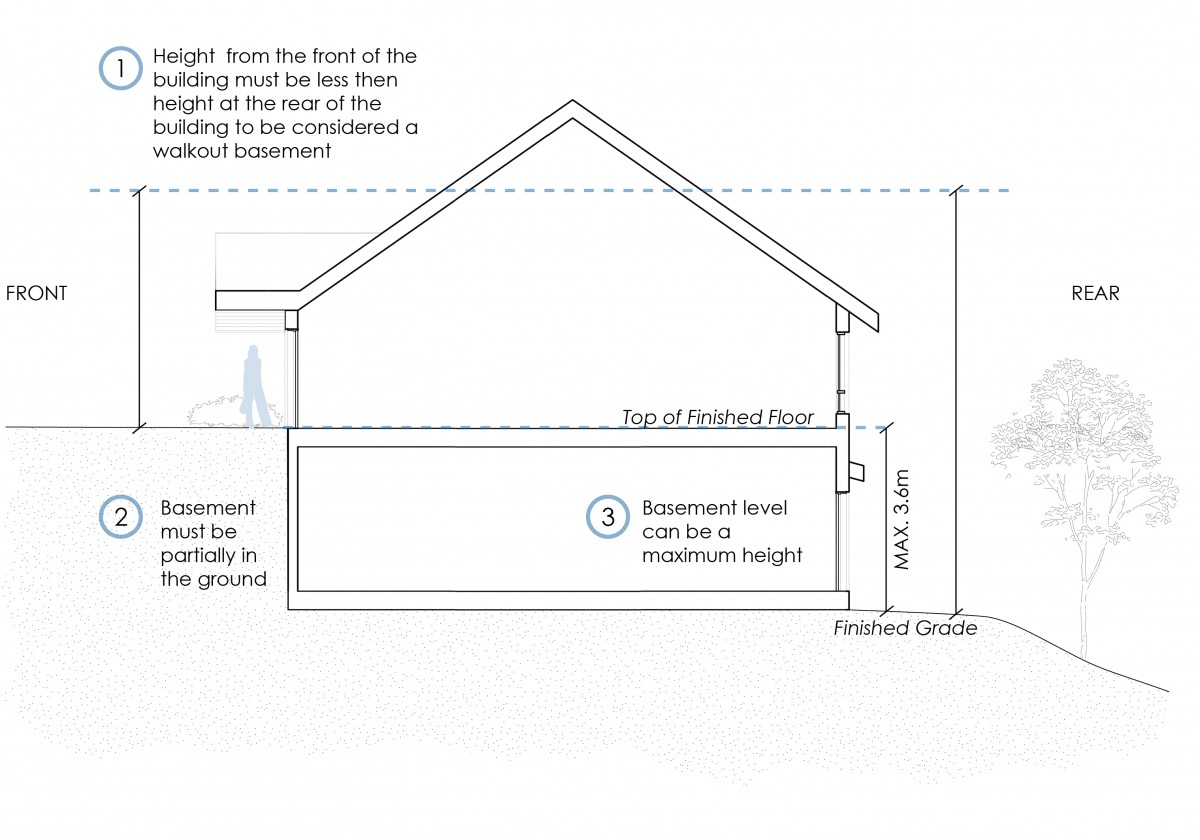 |
BED AND BREAKFAST HOMES means the accessory use of a residence in which temporary overnight accommodation and breakfast is provided to tourists.
See Section 9.3 for specific regulations of bed and breakfast homes.
BEDROOM means a room located within a dwelling unit where the primary function is for sleeping. Regardless of the room’s name (including but not limited to) dens, flex rooms, lofts, studies, libraries, etc. if the room’s layout could be utilized primarily for sleeping then the room shall be considered a bedroom.
BOARDER means a non-family member who is a lodger, roomer, or person who pays for and takes regular lodging, with or without meals.
BOARDING OR LODGING HOUSE means the use of a ground oriented dwelling unit in which the owner or manager may supply sleeping unit accommodation for family and for remuneration. It may or may not include meal service. Boarding or lodging houses must operate as a single household up to a maximum of 10 persons. Short-term rental accommodations is not permitted within a boarding or lodging house.
BOAT LAUNCHES means a ramp that extends from an upland property or right-of-way across the foreshore and into the lake, the purpose of which is to facilitate lake placement and removal of boats and other water vessels.
BOAT LIFTS means an uncovered structure, attached to a dock, which facilitates the removal of boats from the water, and which can allow for a boat to be stored above the high-water level of the lake.
See Section 9.5 Dock and Boatlift Regulations for specific regulations.
BOAT STORAGE means the storage of boats and other marine equipment, which are in working order, for the purpose of dry land moorage where the boats and marine equipment are intended to be launched by the operator of the boat storage facility for short term use by the boat and marine equipment owner. Where the boat storage facility is actively storing 100 or more boats, boat storage includes on-site fuel dispensing for the sole purpose of fueling the boats and marine equipment stored at the facility. The fuel storage tanks must adhere to the Life and Safety Bylaw No.10760 and Best Management Practices outlined in the CCME – Environmental Code of Practice for Aboveground and Underground Storage Tank Systems Containing Petroleum and Allied Petroleum Products. Boat storage does not include major servicing, sales, or major repair of boats or marine equipment.
BREEZEWAY means a connection between buildings that is not enclosed, not heated, not insulated, and is not restricted by intervening doors.
BUILDING ENVELOPE AREA means the remainder area of a lot after excluding the setbacks areas and all areas of the lot that have a ‘no build’ restrictive covenant or a ‘no disturb’ restrictive covenant for any environmental or geotechnical purposes, or easements & statutory rights-of-way. (See Figure 5.2).
| Figure 5.2 - Building Envelope Area |
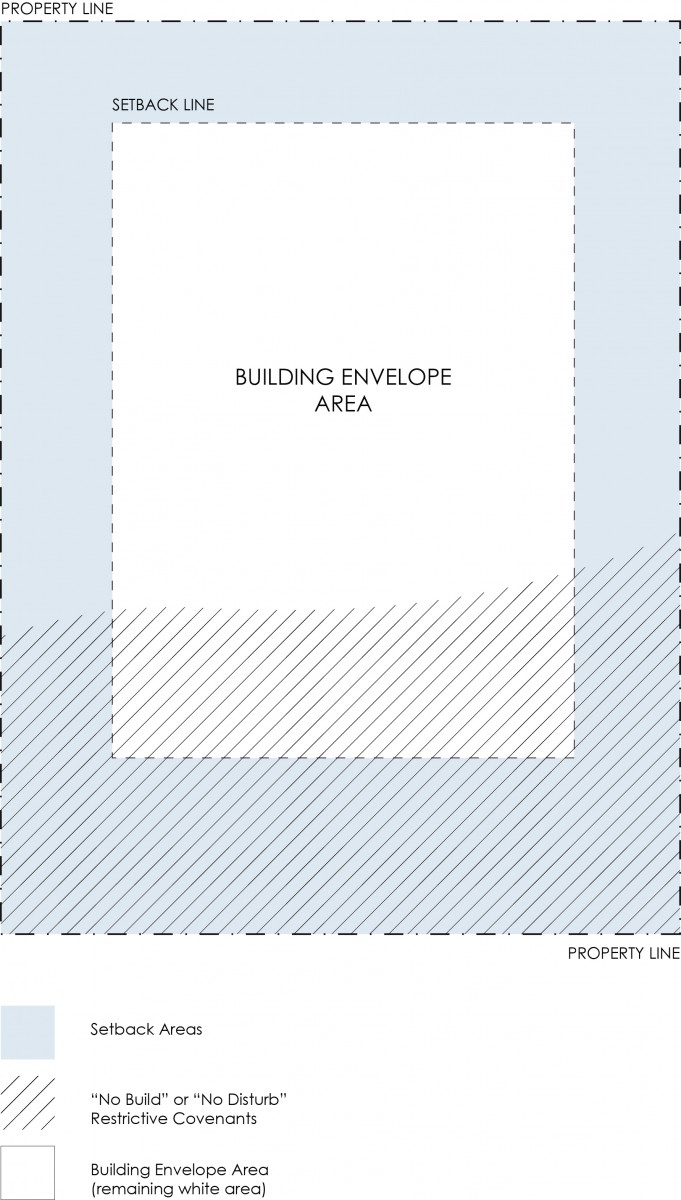 |
BUILDING means a temporary or permanent structure having a roof supported by columns or walls for the shelter or enclosure of persons, animals, materials, chattels and/or equipment.
BUILDING FRONTAGE means the measurement of the length of a building wall which directly faces a street.
BUILDING OFFICIAL means the persons appointed by City Council to administer and enforce the provisions of the City of Kelowna Building Bylaw, 1993, No. 7245 and the City of Kelowna Plumbing Regulation Bylaw No. 5968-87.
BUILDING PERMIT means a permit issued in accordance with the City of Kelowna Building Bylaw, 1993, No. 7245.
BULK FUEL DEPOT means lands, buildings, and structures for the bulk storage and distribution of petroleum products and may include key lock retail sales.
BUSINESS means one establishment for carrying on a commercial or industrial undertaking of any kind or nature, or the providing of professional, personal, or other service for gain or profit. This includes a home-based business.
BYLAW ENFORCEMENT OFFICER means the officers or employees appointed by Council as such.
CALIPER means the trunk diameter of a tree measured at a point 300 millimeters above the top of the root ball.
CAMPSITES means the use of land which has been planned and improved for the seasonal short-term use of holiday trailers, motor homes, tents, campers and similar recreational vehicles. This land use is not to be used as year-round storage or accommodation for residential use for more than 240 days in one year.
CANNABIS means cannabis as defined in the Controlled Drugs and Substances Act and includes any products containing cannabis.
CANNABIS CULTIVATION means a land use involving the growing of cannabis:
- outdoors in a field; or
- inside a structure that has base consisting entirely of soil (e.g., greenhouses); or
- in a structure approved by the ALC.
CANNABIS PRODUCTION FACILITY means a facility for producing, processing, sorting, providing, shipping, delivering and/or destroying of cannabis and cannabis related products can include analytical testing in permitted industrial zones and must be licensed by Health Canada. This land use does not include the retail sale or dispensing of cannabis.
See Section 9.9 Cannabis Regulations for specific regulations.
CANOPY means a non-retractable hood cover or marquee which projects from the wall of a building. It does not include an awning, projecting roof, roof eaves, or enclosed structure.
CARPORT means a roofed structure free standing or attached to the principal building which is not enclosed on the front and at least one side, used by the building occupants to shelter parked vehicles.
CARRIAGE HOUSE means a dwelling unit located within a building that is subordinate to the principal building on the lot and is not an accessory building or structure. A carriage house shall not be stratified.
CAR-SHARE ORGANIZATION means operations that allow members of the general public to book vehicles on a short-term as-needed basis, paying only for the time they use the vehicle and the distance they drive. The operators are responsible for maintenance, insurance and vehicle booking through an online application.
CAR-SHARE VEHICLE (CLASSIC) a vehicle owned or leased by a car-share organization where the vehicle is returned to the same location at the end of every booking to a shared-vehicle parking area.
CAR-SHARE VEHICLE (ONE-WAY) a vehicle owned or leased by a car-share organization that has no fixed or dedicated parking space.
CAR-SHARE VEHICLE PARKING SPACE a parking space reserved for the exclusive use of a classic or one-way car share vehicle.
CEMETERY means those areas of land that are set aside for the burial of human remains. Typical uses are memorial parks and burial grounds, including crematoriums.
CHANNELIZED STREAM means permanent or relocated streams that have been dyked, diverted, or straightened and carry drainage flows from headwaters or significant sources of groundwater. Reaches of channelized streams may be confined by roads and fences and in many cases can also meander through fields. Human constructed channels that divert irrigation water from a stream but return overflow water back to a stream in a manner that allows fish access is classified as channelized streams.
CHILD CARE CENTRE, MAJOR means an establishment licensed as required under the Community Care and Assisted Living Act intended to provide care, educational services, and supervision for more than 8 children. See Table 8.3.6 for parking requirements of Child Care Major uses.
CHILD CARE CENTRE, MINOR means an establishment licensed as required under the Community Care and Assisted Living Act intended to provide care, educational services, and supervision for no more than 8 children. The care must be provided by a principal resident that resides at the dwelling for more than 240 days of a year.
CITY means the Corporation of the City of Kelowna.
CLEARANCE means the unobstructed vertical distance between the finished grade or finished floor and the underside of a canopy, awning, ceiling, or structure.
COMMERCIAL STORAGE means a self-contained building or group of buildings containing lockers available for rent for the storage of personal goods or a facility used exclusively to store bulk goods of a non-hazardous nature.
COMMERCIAL USE means an occupation, employment or enterprise that is carried on for gain or monetary profit by any person.
COMMERCIAL ZONES are any zones described in Section 14 Core Area and Other Zones of this Bylaw or any CD zone in which the predominant use, as determined by its general purpose and list of permitted uses, is of a commercial use nature.
COMMON AND PRIVATE AMENITY SPACE means a useable open space area, exclusive of parking spaces, which is developed exclusively for the recreational use of the residents and includes: indoor common amenity space, outdoor common space, common terraces, common rooftop spaces, private decks, level landscaped recreation areas, and balconies. Landscaped areas required in Section 7 cannot be counted towards common and private amenity space.
COMMUNITY GARDEN means the recreational growing of plants on a lot and does not include the growing and subsequent sale of produce for commercial purposes. This definition does not include the keeping of poultry and/or livestock.
See Section 9.6 Agriculture, Urban for specific regulations.
CONCRETE AND ASPHALT PLANTS means the processing, manufacturing, recycling, and sales of concrete and asphalt and the accessory manufacturing and sales of products made from concrete and asphalt.
CONFINED LIVESTOCK AREA means an outdoor area, other than a grazing area, seasonal feeding area or temporary holding area, where livestock or poultry are confined by structures or topography.
CONGREGATE HOUSING means housing in the form of multiple sleeping units where residents are provided with common living facilities, meal preparation, laundry services and room cleaning. Congregate housing may also include other services such as transportation for routine medical appointments and counselling. Congregate housing may be in any apartment or townhouse form. Congregate housing does not include student residences.
CONSTRUCT OR CONSTRUCTION includes build, erect, install, repair, alter, add, enlarge, move, locate, re-locate, re-construct, upgrade, remove, or excavate.
CONSTRUCTED CHANNEL means constructed drainage channels that carry drainage water from more than one property but do not carry water from headwaters or significant sources of groundwater. Flows in agricultural constructed channels may be year-round and are not regulated. Constructed channels may also deliver water for irrigation purposes.
CONSTRUCTED DITCH means drainage channels that carry drainage water from one property only but do not carry water from headwaters or significant sources of groundwater. Flows in agricultural constructed ditches may be year-round and are not regulated. Constructed ditches may also deliver water for irrigation purposes.
CORE AREA means those areas identified as a ‘Core Area’ within the mapping areas identified within the Official Community Plan.
COUNCIL means the Municipal Council of the City of Kelowna.
CSA means Canadian Standards Association.
CULTURAL AND RECREATION SERVICES means development for recreation, social, local community multi-purpose purposes, private clubs, spectator entertainment establishments, libraries and cultural exhibits. Typical uses include but are not limited to community halls, social clubs, private clubs, libraries, museums, art galleries, auditoria, cinemas, and concert halls.
DECK means an uncovered, platform without a roof or walls, which may include visual partitions and railings, and has a surface height greater than 0.6 metres above finished grade.
DENSITY means a measure of the intensity of development to the area of the lot, including the number of units on a lot measured in units/area or floor area ratio, as the case may be. When calculation of density involves a number of units per lot and yields a fractional number, the number of units permitted shall be rounded down to the lowest whole number.
DETENTION AND CORRECTION SERVICES means development for the purpose of holding or confining and treating or rehabilitating persons. Typical uses include but are not limited to prisons, jails, remand centres, and correction centres.
DEVELOPMENT includes any activity that the City is authorized to regulate under Part 14 of the Local Government Act.
DIRECT CURRENT FAST CHARGING (DCFC) means direct current electric vehicle charging as defined by SAE International's J1772 standard and includes provision of electric vehicle charging equipment.
DIRECTOR OF PLANNING & DEVELOPMENT SERVICES means the person appointed as such by the City and includes the person’s lawful designate.
DOCKS means a structure that is permanently affixed to aquatic land and can be used on a year-round basis. Docks do not include seasonal temporary moorage facilities which are withdrawn from the water and are stored on the upland during the winter season.
See Section 9.5 Dock and Boatlift Regulations for specific regulations.
DORMER means a structural element of a building that projects from the plane of a sloping roof surface.
See Section 6.10 for specific regulations including setback requirement.
DRIVE THROUGH means any commercial development providing a product or service where a queuing lane exists on-site where customers typically remain within the vehicle. Drive through must meet the development regulations and siting regulations outlined in Section 9.4.
DUPLEX HOUSING means a building designed exclusively to accommodate two households living independently in separate dwelling units above or below each other. This type of development is designed and constructed as two dwelling units at initial construction.
DUST FREE SURFACE means surface comprised of asphalt or other hard surface, or chemically treated or washed gravel having a minimum particle size of 100% 2.5 ml gradation.
DWELLING UNIT means accommodation providing interconnected, free flowing space including bedroom(s), washrooms, and a kitchen intended for domestic use, and used or intended to be used permanently or semi-permanently for a household. A dwelling includes only one room which, due to its design, plumbing, equipment, and furnishings, may be used primarily as a kitchen, except where otherwise permitted in the bylaw. Wet bars are permitted. This use does not include a room in a hotel or a motel. A secondary suite and a carriage house are each considered a dwelling unit.
EDUCATION SERVICES means development used for training, instruction, education, and/or certification in a specific trade, skill, or service. This includes schools, administration offices, gyms, maintenance/storage facilities, outdoor recreation, and related accessory buildings. This use includes but is not limited to commercial schools, private schools, public schools, community colleges, universities, technical schools, and vocational schools. Residential dwelling units are permitted within Education Services if the dwelling units are administered by the Education Service.
ELECTRIC VEHICLE means a vehicle that uses electricity for propulsion, and that can use an external source of electricity to charge the vehicle's batteries.
ELECTRIC VEHICLE ENERGY MANAGEMENT SYSTEM means a system to control electric vehicle supply equipment electrical loads comprised of monitor(s), communications equipment, controller(s), timer(s) and other applicable devices.
ELECTRIC VEHICLE SUPPLY EQUIPMENT means a complete assembly consisting of conductors, connectors, devices, apparatus, and fittings installed specifically for the purpose of power transfer and information exchange between a branch electric circuit and an electric vehicle.
EMERGENCY AND PROTECTIVE SERVICES means a public facility used by fire protection, police, ambulance, or other such services as a base of operations.
END-OF-TRIP FACILITIES means the suite of complementary common facilities such as clothing lockers, change room, washroom, shower access, bike repair space, and bike wash stations that are necessary to support cyclists, joggers, walkers, and other active commuters where these amenities are needed at the end of their trip.
ENERGIZED OUTLET means a connected point in an electrical wiring installation at which current is taken to supply electric vehicle supply equipment. An energized outlet can take the form of an outlet box with a cover, or an electrical receptacle.
EXHIBITION AND CONVENTION FACILITIES means a building or site intended to provide permanent facilities for meetings, seminars, conventions, product and trade fairs and similar exhibitions.
FARM RETAIL SALES STANDS means those accessory buildings or structures for retailing agricultural products on a farm.
FARM UNIT means one or more contiguous or non-contiguous lots, that may be owned, rented, or leased, within City limits, which forms and is managed as a single farm.
FENCE means a structure used as an enclosure or for screening purposes around all or part of a lot or a swimming pool.
FIELD STORAGE means storage of agricultural products in the fields for longer than two (2) weeks.
FINANCIAL SERVICES means the provision of financial and investment services by a bank, trust company, investment dealer, credit union, mortgage broker, insurance company or related business. Insurance companies that cater to a specific sector of the commercial or industrial business community and do not offer personal, financial, investment or insurance services are not included in this definition.
FISH means shellfish, crustaceans, and marine animals and the eggs, spawn, spat, and juvenile stages of fish, shellfish, crustaceans, and marine animals.
FLEET SERVICES means development using a fleet of vehicles (three or more) for the delivery of people, goods or services, where such vehicles are not available for sale or long-term lease. Typical uses include but are not limited to ambulance services, rental vehicle, taxi services, bus lines, messenger, and courier services.
FLOOR AREA, GROSS (GFA) means the sum of the horizontal areas of each floor of a building measured from the interior face of exterior walls providing that in the case of a wall containing windows, the glazing line of the windows may be used.
FLOOR AREA, GROSS LEASABLE (GLA) means the sum of the horizontal areas of each floor of a building which is designed to be used exclusively for tenant occupancy measured from the interior face of exterior walls providing that in the case of a wall containing windows, the glazing line of the windows may be used.
FLOOR AREA, NET means the sum of the horizontal areas of each floor of a building measured from the interior face of exterior walls providing that in the case of a wall containing windows, the glazing line of the windows may be used. The net floor area measurement is exclusive of areas used exclusively for storage (storage area must be a common facility accessible by more than one owner), service to the building, attics, garages, carports, breezeways, porches, balconies, exit stairways, common/public corridors, parkades, terraces, common amenity spaces, and building mechanical systems are also excluded. In the case of congregate housing, communal dining and kitchen facilities are excluded.
FLOOR AREA RATIO means the numerical value of the net floor area on all levels of all buildings and structures on a lot, divided by the area of the lot minus excluded areas. The excluded areas of the lot are either within: a Riparian Management Area, a water course area defined by the Natural Environment Development Permit Area (identified within the City of Kelowna’s OCP), or within any slope 30% or steeper.
FOOD PRIMARY ESTABLISHMENT means development where prepared food and beverages are offered for sale to the public. Typical uses include but are not limited to licensed restaurants, theatre restaurants, banquet facilities, cafes, delicatessens, tea rooms, lunchrooms, refreshment stands and take-out restaurants. Licensed restaurants may serve any kind of liquor, even to customers who do not order food. However, a full range of appetizers and main courses must be available whenever liquor is available. These establishments may be holders of a Food Primary liquor licences.
FOOD PRIMARY LICENCE means liquor licence issued by the Province of British Columbia Liquor Control and Licensing Branch for a business in the hospitality, entertainment or beverage industry including restaurants where the service of food rather than the service of liquor is the primary focus of the business.
FORESHORE means the Crown land between the high and low water levels of a lake.
FORESTRY means the extraction, storage, sorting, and grading of primary forest materials.
FRONTAGE means the length of a lot line which immediately adjoins a street other than a lane or walkway.
FUNERAL SERVICES means premises used for the preparation of the dead for burial or cremation and the holding of funeral services.
GAMING FACILITIES means any place that is customarily or regularly used for bingo or other games of chance pursuant to a licence issued by or under the authority of the Provincial Government and includes a social club for which gaming is licensed by the Provincial authority.
GAS BAR means land and/or buildings used for the sale of motor fuel, lubricating oils, automotive fluids and associated convenience store products. The gas bar may be a self-service, full service, key lock, card lock, or other similar operation and may include the servicing, washing, and/or repairing of vehicles as an accessory use. Gas bars shall adhere to the following:
- all pump islands shall be located at least 6.0 metres from any lot line, parking area on the site, or laneways which is intended to control traffic circulation on the site.
- a canopy over a pump island shall not extend to within 3.0 metres of the lot line of the site.
- the canopy area for a gas bar shall not constitute part of the site coverage.
GENERAL INDUSTRIAL USE means land and/or a buildings used principally for one or more of the following: processing of raw materials; the manufacturing or assembling of semi-finished or finished goods, products or equipment, but not food products directly to the public; the storage, cleaning, servicing, repairing or testing of materials, goods and equipment normally associated with industrial, business or household use; terminals for the storage or distribution of materials, goods and equipment; the distribution and sale of materials, bulk goods and equipment to institutions, industrial or commercial businesses for their direct use or to retail stores or other use classes for resale to individual customers; or the training of personnel in general industrial operations.
Any training services, or schooling that is directly related to industrial operations are permitted (for example: industrial truck driving training, machinist operations, etc.). Any training or schooling which is predominately conducted within a classroom setting is only permitted within zones where educational services are permitted. Any indoor display, office, technical, administrative support, or retail sale operations shall be accessory to the general industrial uses listed above. The net floor area devoted to such accessory activities shall not exceed 25% of the gross floor area of the building(s) devoted to the general industrial use. This use includes autobody and repair shops.
General industrial uses are not permitted to have outdoor storage of toxic, noxious, explosive, odourous, or radio-active materials. General industrial uses are not permitted to carry out their operations such that there would be a nuisance factor from noise, odour, earth borne vibrations, heat, high brightness light sources, or dust created or apparent outside an enclosed building except for I3 – Heavy Industrial zoned properties. However, I3 zoned properties are not permitted to carry out their operations such that there would be a significant nuisance factor created beyond the boundary of the I3 zone.
GRADE, FINISHED means the elevation of the finished surface of the ground at the base of the outside walls of a building or structure. Finished grade is determined by taking the level of the finished ground surface at every location of change of grade along the outside walls of a building or structure. Finished grade must be at least 1.5 metres wide measured from the base of the wall or the width of the setback in that location (whichever is less). The finished grade can increase or decrease at a maximum rate of 15% from the base of the wall to the width of the setback at that location or at least 1.5 metres wide (whichever is less). Window wells and access stairwells are exempted for determination of finished grade. See illustrative figures below.
Finished grades shall follow specific grading regulations outlined in Section 6.11 Grading.
| Figure 5.3(a) - Finished Grade: Single Detached Housing |
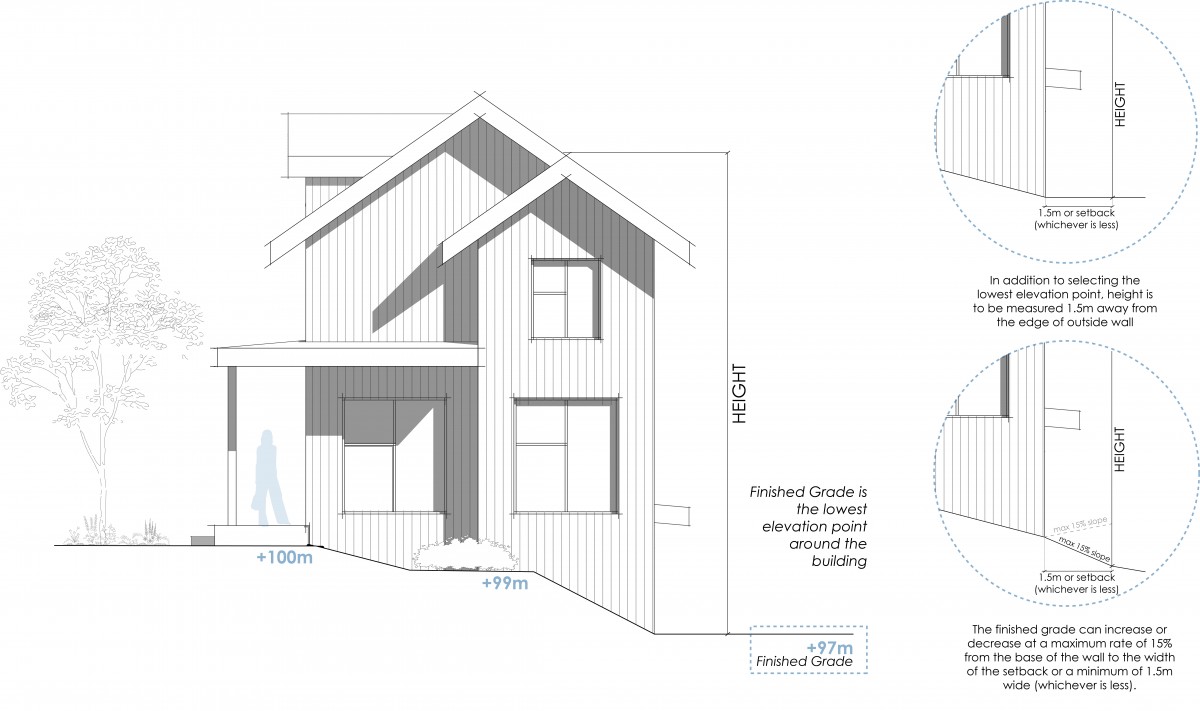 |
| Figure 5.3(b) - Finished Grade: Apartment |
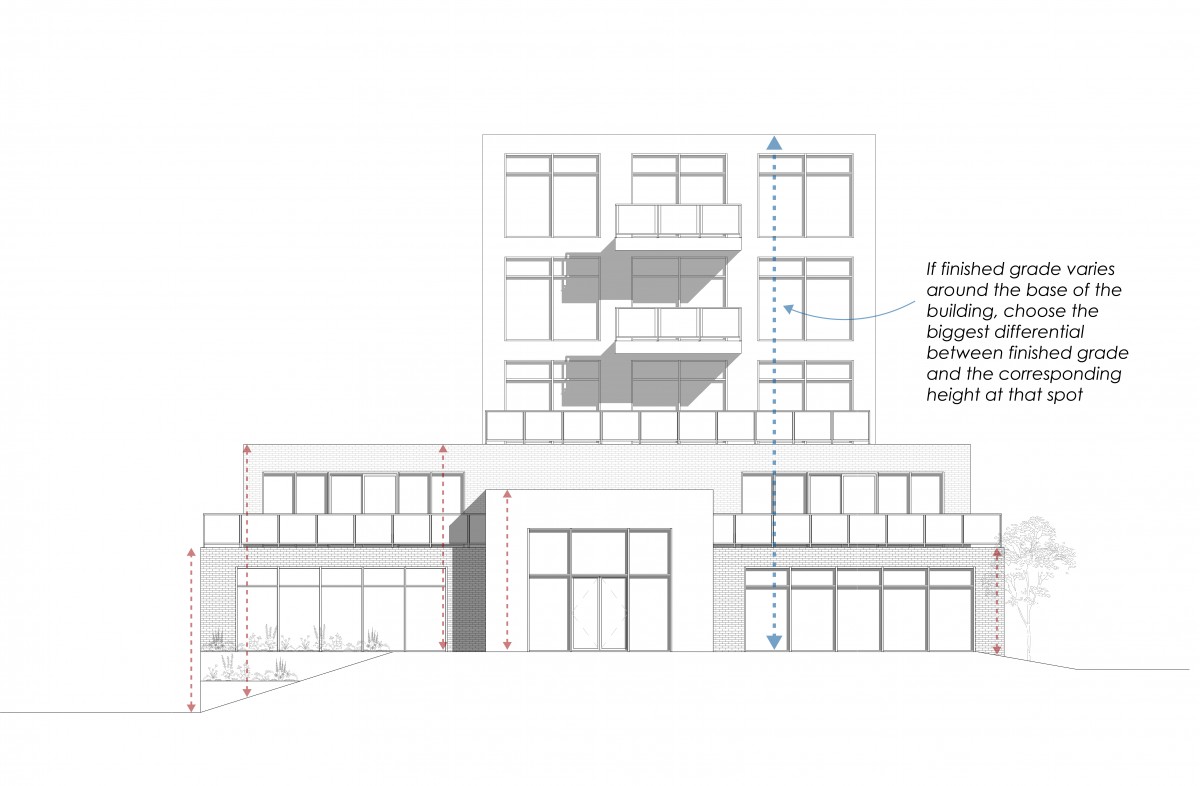 |
| Figure 5.3(c) - Finished Grade: Sloped Fronting Road |
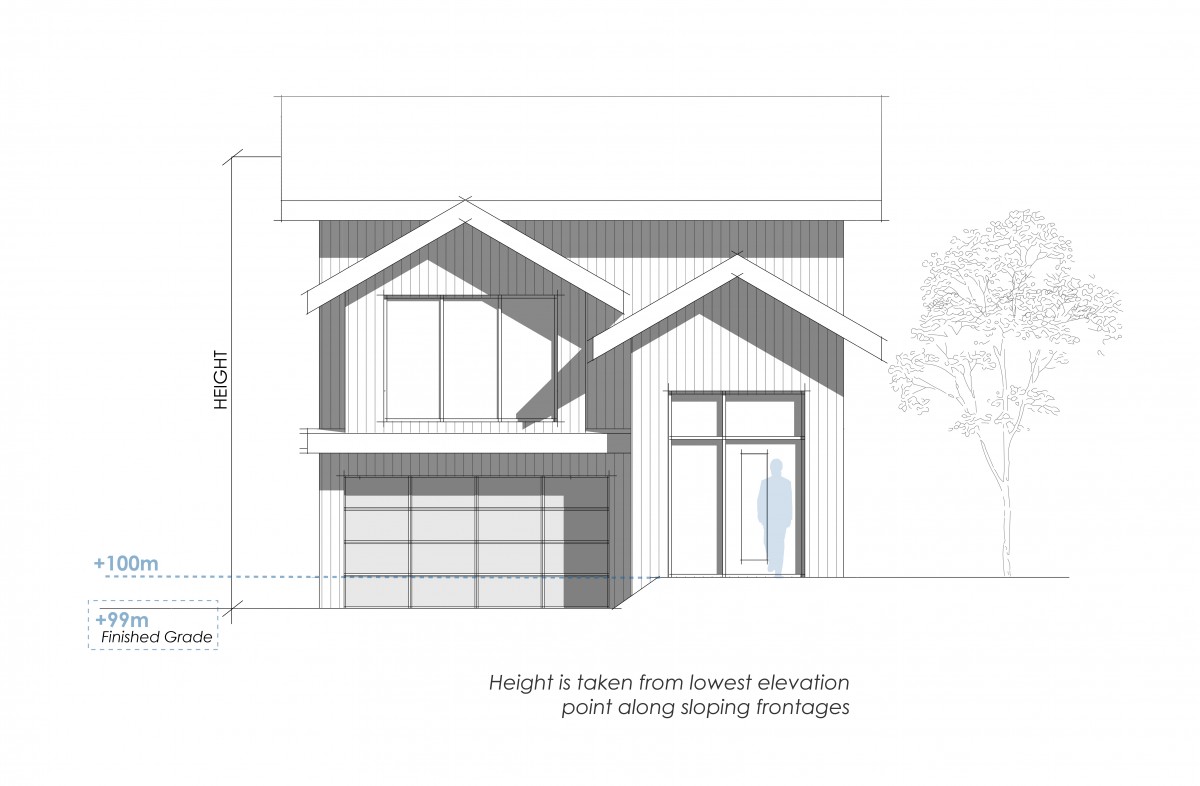 |
GRADE, NATURAL means the elevation of the ground surface in its natural state, before human alteration, or on sloping or irregular sites, the angled plane, before human alteration.
GRAZING AREA means a pasture or rangeland where livestock, poultry or farmed game is primarily sustained by direct consumption of feed growing in the area.
GREENHOUSE means a structure covered with translucent material, used for the purpose of growing plants, and is of sufficient size for persons to work within the structure.
GREENHOUSES AND PLANT NURSERIES means development used primarily for the cultivation and storage of produce, bedding, household and ornamental plants, trees, bushes, sod, and related materials. This use does not include landscaping, excavating or soil processing businesses or operations.
GROUND-ORIENTED, COMMERCIAL means any commercial unit that has:
- an entrance / exit door to the exterior of the building, entered directly from a fronting publicly accessible street, walkway, or open space (i.e., without passing through a shared indoor lobby or corridor). Ground-oriented commercial units can also have a second access and egress via a shared lobby or common corridor;
- should be designed to be as universal accessible as possible from the fronting publicly accessible street, walkway, or open space. The maximum floor elevation of the commercial unit above or below the fronting publicly accessible street, walkway, or open space is 1.0 metre in order to be considered ground oriented; &
- any setback reduction granted to ground-oriented commercial units only applies to those units and not to other commercial units or to any other floor area, except, the setback reduction can be applied to the main lobby of a building.
GROUND-ORIENTED, RESIDENTIAL means residential dwelling units of one or more storeys in height, each of which has its:
- own private outdoor space attached to the dwelling unit (typically situated at ground level).
- primary entrance (i.e., front door) on the exterior of the building, entered directly from a fronting publicly accessible street, walkway, or open space (i.e., without passing through a shared indoor lobby or corridor). Ground-oriented housing can also have a second access and egress via a shared lobby and /or common corridor.
- any setback reduction granted to ground-oriented housing can be applied to the main lobby of a building.
| Figure 5.4 - Ground Oriented Housing |
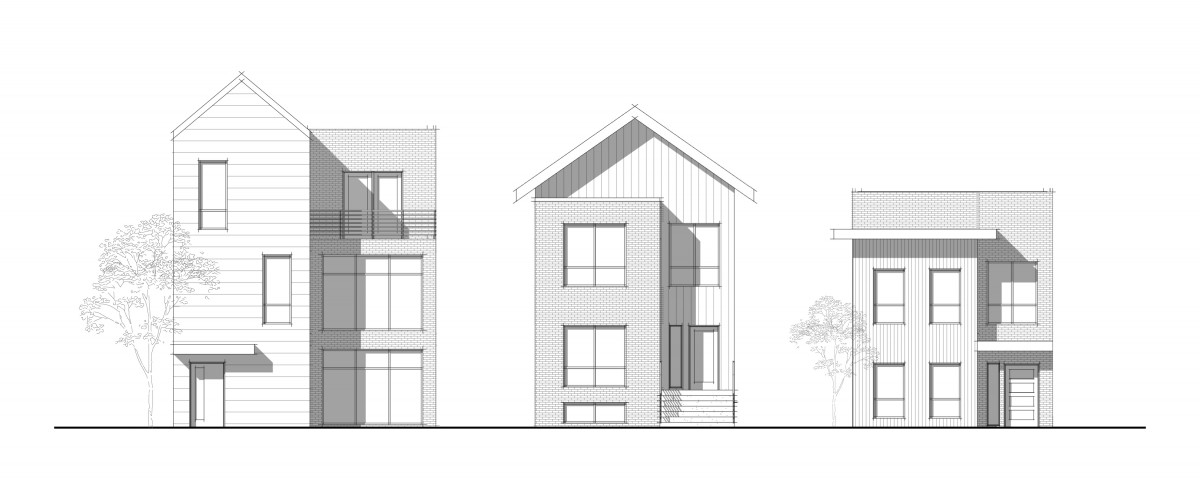 |
GROUP HOME means the use of a dwelling unit within single detached housing, semi-detached housing, or a duplex housing with living arrangements whereby clients with disabilities or other unique conditions share personal care resources. These services are designed to maximize independence and to support responsibility in areas such as household management, vocation pursuits, and social relationships. Group Homes cannot have more than 10 persons and no more than 6 persons who are persons in care. The character of group homes is that the occupants live together as a single housekeeping group and use a common kitchen. Short-term rental accommodations is not permitted within a Group Home.
HEALTH SERVICES means a development used for the provision of physical or mental health services on an out-patient basis. Services may be of a preventative, diagnostic, treatment, therapeutic, rehabilitative, or counseling nature. Typical uses include, but are not limited to, medical and dental offices, chiropractors, massage therapists and acupuncture clinics, health clinics, and counseling services. This use does not include the retail sale or dispensing of cannabis.
HEIGHT with respect to a building refers to the maximum vertical distance between finished grade and the highest point of the structure of a non-sloping roof, or the mid-point of a sloping roof.
In determining whether a development conforms to the maximum height permitted in any zone, structures such as chimney stacks, aerials, antennae, water towers, wind machines, monuments, observation and transmission towers, farm silos, steeples, elevator housings, roof stairway entrances, ventilating equipment, firewalls, skylights, or flagpoles for federal, provincial, or municipal flags shall not be considered for the purpose of determining the height. Dormers will not be considered in the structure’s overall height measurement. However, see Section 6.10 for specific dormer regulations.
| Figure 5.5 - Height Measurements |
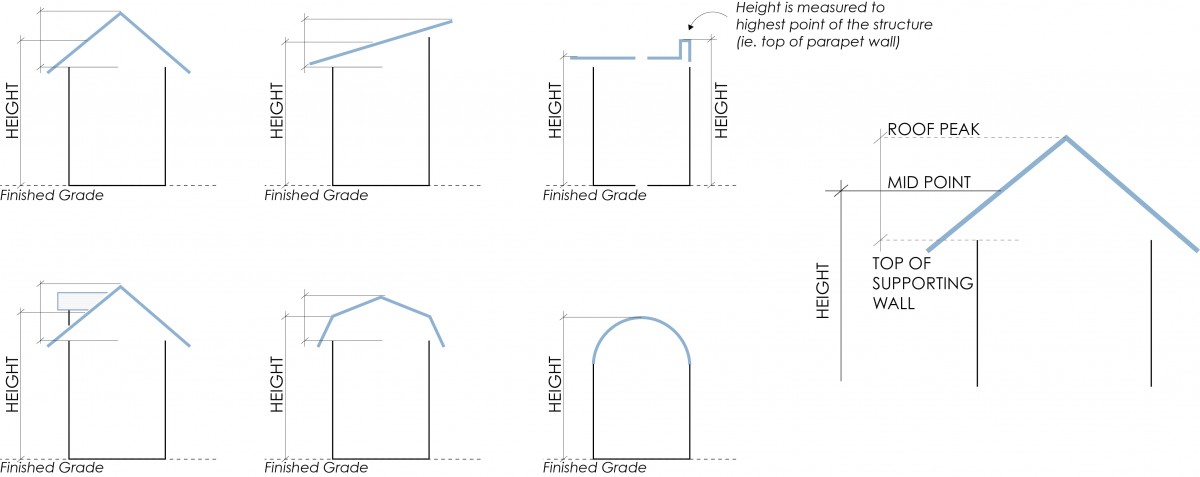 |
| Figure 5.6 - Dormers |
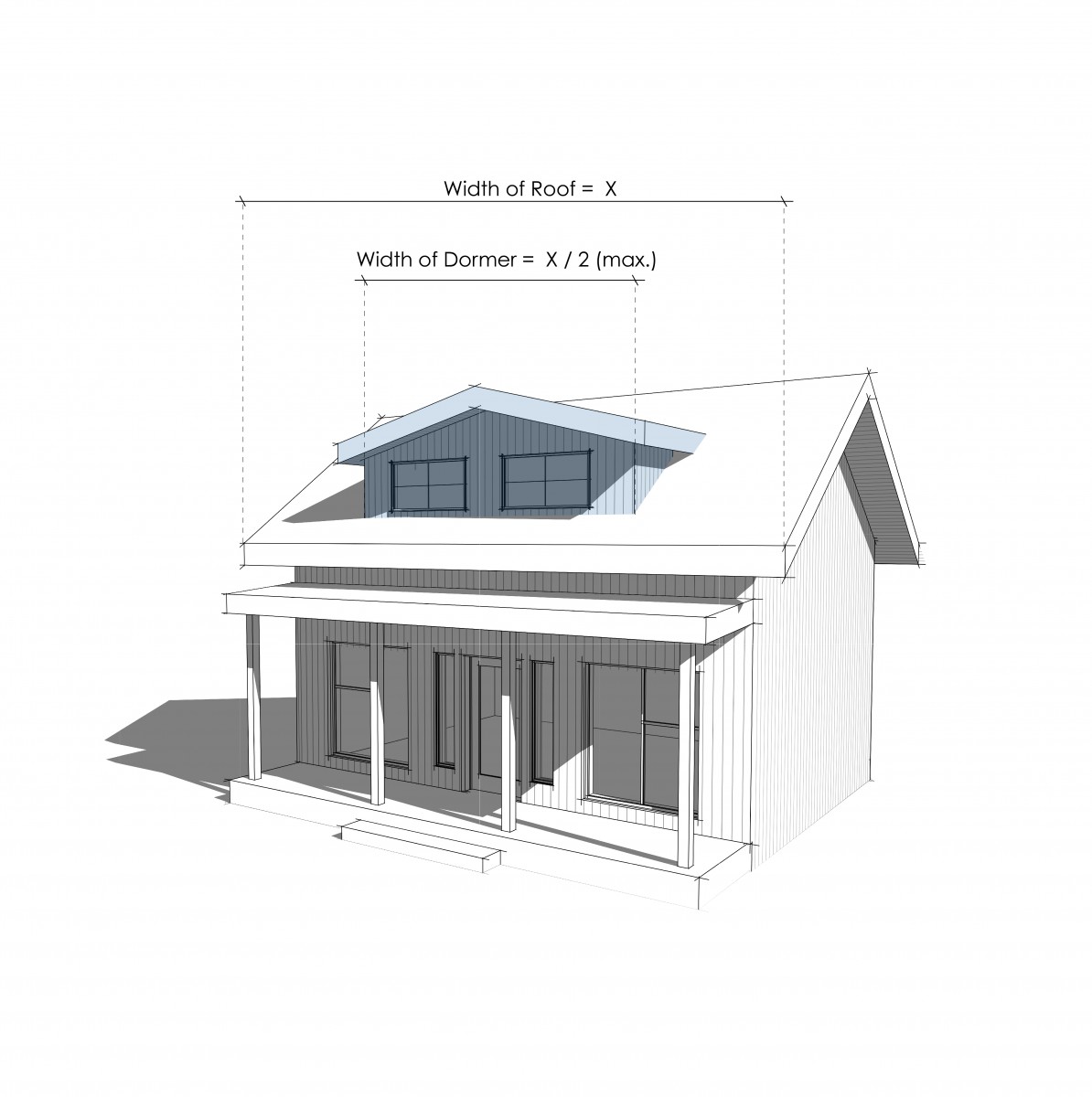 |
HOME-BASED BUSINESS means development consisting of the use of a dwelling unit or accessory building for a business by a resident. The business must be secondary to the residential use of the building and shall not change the residential character of the dwelling or accessory building.
This use does not include automotive & equipment. This use also does not include the retail sales of products not produced on site, with the exception of mail order sales, website sales, telephone sales, or goods where the customer does not enter the premises to inspect or pick up the goods or products incidental to the service provided.
Home-Based Businesses are divided into three categories: Minor, Major, and Rural:
- Minor home-based businesses are intended to operate within a dwelling unit only (not an accessory building) and have no aspects of business operations detectable from outside the property.
- Major home-based businesses are intended to operate within a dwelling unit (or within an accessory building).
- Rural home-based businesses are intended to operate within a dwelling unit (or within an accessory building) and can be more intensive than major home-based businesses (see Section 9.2 for differences). Rural home-based businesses are the only home-based businesses that permit any type of cutting and wrapping of wild game or any other meat.
See Section 9.2 for specific Home-Based Business Regulations.
HOSPITAL means a public institution providing health services for both in-patients and out-patients including room, board, emergency care, and the prevention and treatment of sickness, disease, or injury. This use is intended to include: standard administrative and operational support functions; small offices for health-related fundraising charities and research advocacy organizations; areas for staff wellness such as gyms and non-residential sleep rooms; provision for compassionate religious services (not to include a regular congregation); a lawfully operated helipad; and institutional cafeteria services. The secondary operation of private medical practices which accommodate patients for specialized procedures or services are permitted only if it is necessary for that procedure or service to be delivered in a hospital setting.
HOTELS means a building or part thereof with a common entrance lobby and shared corridors, which provides sleeping accommodation for transient visitors and may include public facilities such as restaurants, banquet, beverage, meeting and convention rooms, recreation facilities, and personal service establishments for the convenience of guests. The maximum length of stay is no more than 240 days.
HOUSEHOLD means:
- a person; or
- two or more persons related by blood, marriage, or adoption; or associated through foster care, all living together in one dwelling unit as a single household using common cooking facilities; or
- a group of not more than five persons, including boarders, who are not related by blood, marriage, or adoption, or associated through foster care, all living together in one dwelling unit as a single household using common cooking facilities; or
- a combination of (b) and (c), provided that the combined total does not include more than 3 persons unrelated by blood, marriage or adoption or associated through foster care; all living together in one dwelling unit as a single household using common cooking facilities;
- in addition, a household may also include up to one housekeeper or nanny.
IMPERMEABLE SURFACE means a surface which either prevents or impedes the entry of water into the soil mantle as under natural conditions prior to development, and/or a hard surface area which causes water to run off the surface in greater quantities or at an increased rate of flow from the flow present under natural conditions prior to development. A surface will be considered impermeable when the runoff coefficient is greater than 0.3 as per the following table. Surfaces other than those listed in the table are to be presented complete with all applicable support material such as historical and manufacturer details to the City Engineer for approval of the proposed runoff coefficient and surface designation. All manufactured surfaces are to be installed with permeable joints and base material. The base material is to be to a depth recommended by the manufacturer to ensure infiltration and storage.
| Table 2.1 Impermeable Surface Run-Off Coefficients | ||
| SURFACE | RUN OFF COEFFICIENT | |
| Forested | 0.059- 0.2 | |
| Lawns, well drained (sandy soil) | Up to 2% slope | 0.05 – 0.1 |
| 2% to 7% slope | 0.1 – 0.15 | |
| Over 7 % slope | 0.15 – 0.2 | |
| Lawns, poor drained (clay soil) | Up to 2% slope | 0.13 – 0.17 |
| 2% to 7% slope | 0.18 – 0.22 | |
| Over 7 % slope | 0.25 – 0.35 | |
| Asphalt | 0.7 – 0.95 | |
| Concrete | 0.8 – 0.95 | |
| Shingle Roof | 0.75 – 0.95 | |
| Brick Pavers (12mm joint or less) | 0.7 – 0.85 | |
| Turfstone (with permeable cells) | 0.25 | |
| Grasspave | 0.1 – 0.25 | |
| Uni Eco-Stone (with permeable joints) | 0.25 | |
| Figure 5.7 - Impermeable Surfaces |
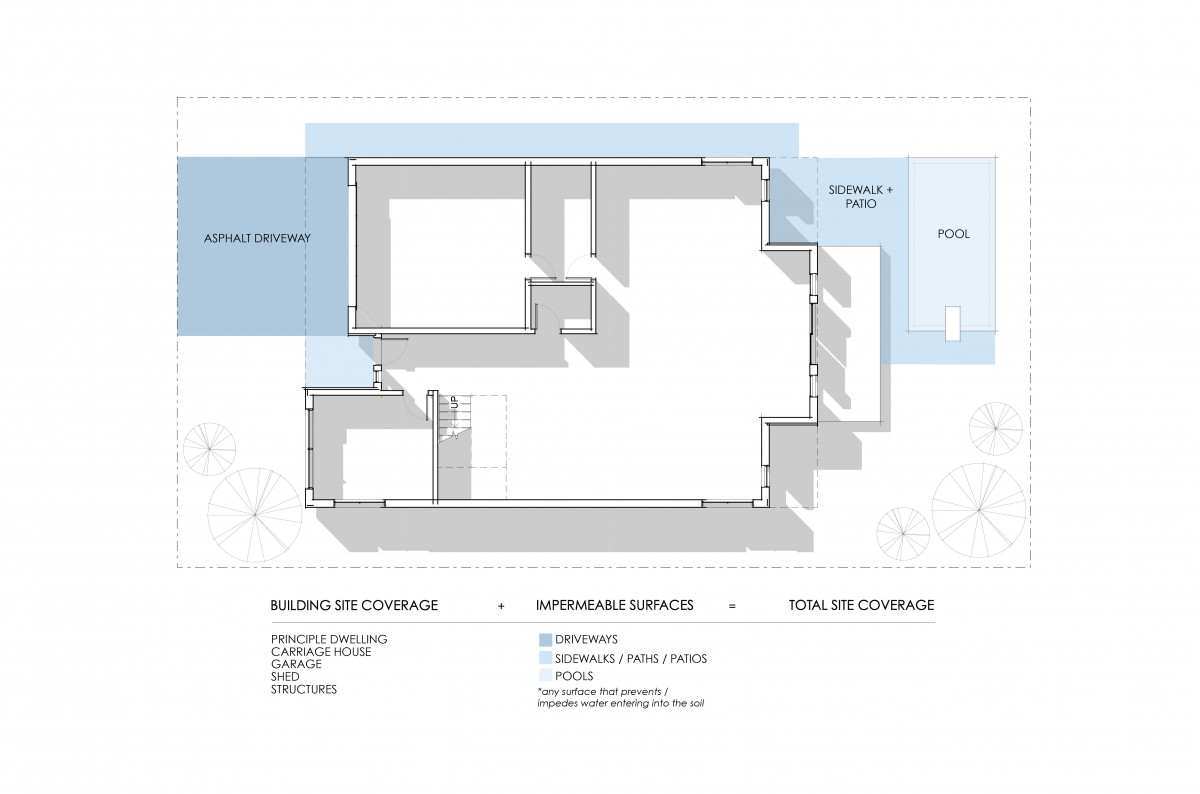 |
INDUSTRIAL ZONES are any zones described in Section 14 Core Area and Other Zones of this Bylaw or any CD zone in which the predominant use, as determined by its general purpose and list of permitted uses, is of an industrial nature.
INFILL HOUSING means any form of development on a lot within the C-NHD - Core Area Neighbourhood or the S-RES – Suburban Residential future land use designation outlined within the OCP that contains or will contain three to six dwelling units and / or any form of development on a MF1, MF4, RU1, RU2, or RU3 zoned lot that contains or will contain three to six dwelling units.
INSTITUTIONAL ZONES are any zones described in Section 14 Core Area and Other Zones of this Bylaw or any CD zone in which the predominant use, as determined by its general purpose and list of permitted uses, is of an institutional nature.
KENNELS means a building used for the breeding, buying, selling or overnight boarding of animals including individual dogs, cats, or other domesticated animals excluding livestock and horses.
KITCHEN means facilities for the preparation or cooking of food, and includes any room containing counters, cabinets, plumbing, or wiring, which may be intended or used for the preparation or cooking of food.
LANDSCAPE AREA means the area up to a maximum of 3.0 metres located into a required: front yard setback area, flanking side yard setback area, rear yard setback areas, or industrial side yard setback area.
LANDSCAPING means changing, modifying, or enhancing the visual appearance of a site including reshaping the earth, planting lawns, shrubs, trees or preserving the original natural vegetation, adding walks, fencing, patios and other ornamental features for the purpose of beautifying or screening the appearance of a lot. Landscaping excludes those features with roofs and those used for shelter or those structures that provide opaque (solid) screening beyond the permitted provisions for fencing described in Section 7 Site Layout of this Zoning Bylaw. See Section 7 Site Layout for specific landscaping regulations.
LANE means a highway under the Local Government Act more than 3.0 metres but not greater than 8.0 m in width.
LEVEL 2 CHARGING means a Level 2 electric vehicle charging level as defined by SAE International's J1772 standard and may include variable rate charging that is controlled by an electric vehicle energy management system.
LEVEL 3 CHARGING [deleted]
LIQUOR PRIMARY ESTABLISHMENT means development where alcoholic beverages are offered for sale to the public from establishments which may include forms of entertainment such as (but not limited to) dancing, singing, or cabaret entertainment. Must hold a Liquor Primary Licence. Off-sales of alcoholic beverages are a permitted ancillary use.
LIQUOR PRIMARY LICENCE means a liquor licence issued by the Province of British Columbia Liquor and Cannabis Regulation Branch for a business in the hospitality, entertainment or beverage industry including bars, pubs, nightclubs, recreation centres and stadiums, where the service of liquor is the primary focus of the business.
LIVESTOCK means cattle, horses, sheep, goats, swine, rabbits, fish, farmed game and exotic animals as prescribed by the Specialty Farm Operations Regulation under the Farm Practices Protection (Right to Farm) Act.
LOADING SPACE means an on-site loading space reserved for temporary vehicular parking for the purpose of loading or unloading goods and materials.
See Section 8.4 Off-Street Loading for specific regulations.
LONG-TERM BICYCLE PARKING means bicycle parking that is specifically provided and equipped for residents, students, employees, and others who generally stay at a site for several hours. The parking provided shall be easy to access for a range of users, secure for long periods of time and provide shelter from weather.
LOT means a parcel of land, including Crown Land, which is legally defined either by registered plan or description.
LOT AREA means the total horizontal area within the lot lines of a lot.
LOT DEPTH means the horizontal distance between the mid-points of the front and rear lot lines.
LOT LINE means the legally defined boundary of any lot or property line.
LOT LINE, FRONT – COMMERCIAL AND INDUSTRIAL means the street frontage onto which the primary façade or front yard of the building faces or as approved by the Director of Planning & Development Services.
LOT LINE, FRONT – URBAN AND RURAL RESIDENTIAL means, in the case of an interior lot, a lot line separating the lot from the street or bareland strata road; or in the case of a corner lot, a line separating the narrowest street frontage of the lot from the street not including a corner rounding or corner cut; or for a lot configuration that is not otherwise described in this definition, front lot line as approved by the Director of Planning & Development Services.
LOT LINE, REAR means either the lot line opposite to, and most distant from, the front lot line, or, where there is no such lot line, the point of intersection of any lot lines other than a front lot line which is furthest from and opposite the front lot line.
LOT LINE, SIDE means any lot boundary line which is not a front or rear lot line.
LOT WIDTH means the width of a lot where it abuts the street except in the case of an irregularly shaped lot, where the width shall be the horizontal distance between the side lot lines at the minimum front yard setback. For a reverse pie lot, the lot width is the horizontal distance between the side lot lines at the minimum rear yard setback.
LOT, BARELAND STRATA means a lot in a bare land strata plan.
LOT, CORNER means a lot situated at the intersection of two or more streets, or a lot that has two adjoining lot lines abutting a street which substantially changes direction at any point where it abuts the lot.
LOT, DOUBLE FRONTING, (or THROUGH) means a lot which abuts two streets which are parallel or nearly parallel to the lot. In these cases, both streets will be considered front yards (with no rear yard).
LOT, INTERIOR means a lot other than a corner lot.
LOT, PANHANDLE means a lot which has its primary legal access from a street through a narrow strip of land which is an integral part of the lot. This narrow strip is referred to as the panhandle.
| Figure 5.8 - Panhandle Lot |
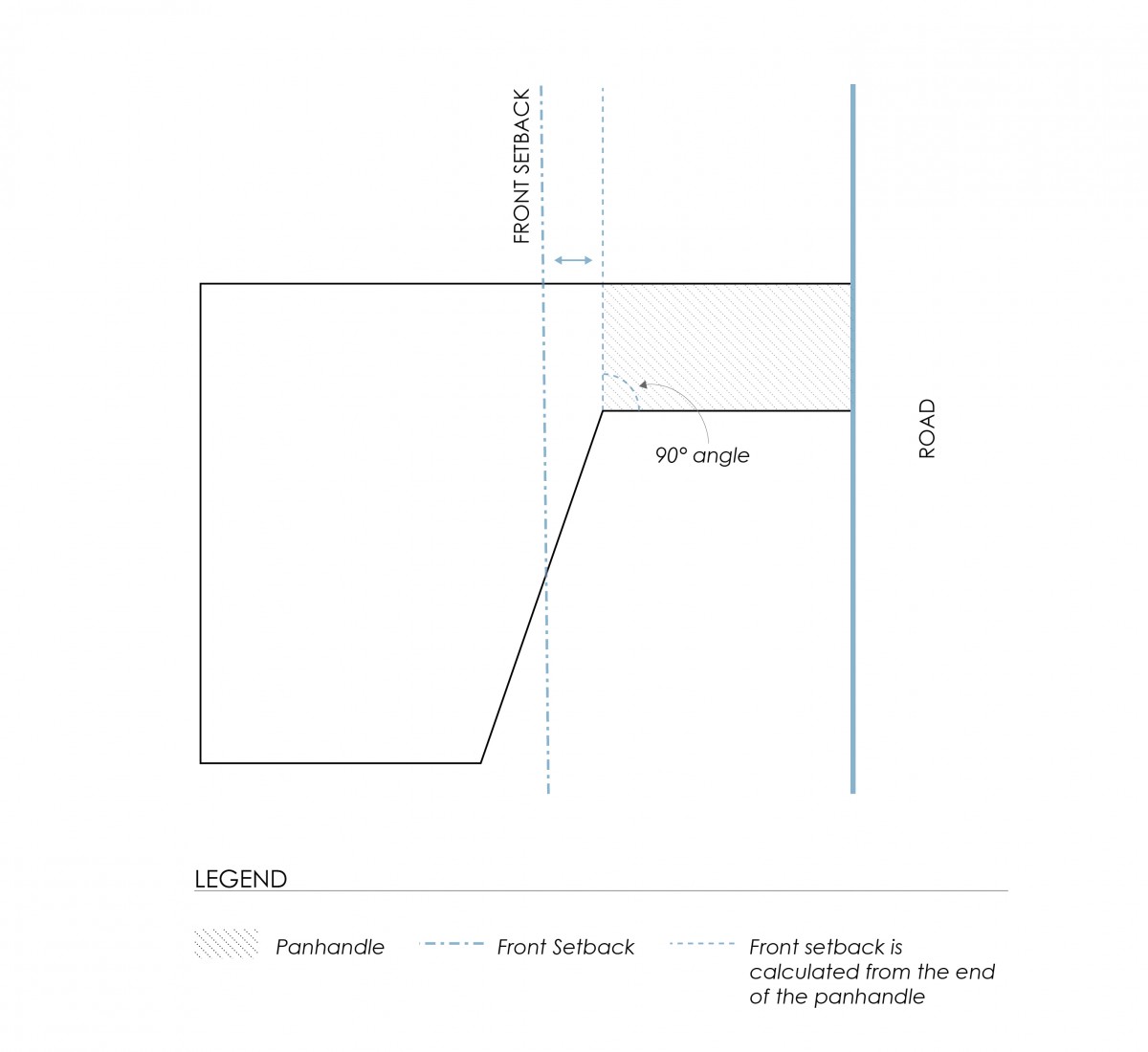 |
LOT, PIE means a lot which is generally configured such that its width at the rear lot line is greater than at its front lot line.
LOT, REVERSE PIE means a lot which is generally configured such that its width at the rear lot line is less than at its front lot line.
LOT, STRATA means a lot shown on a strata plan according to the Strata Property Act.
MARINAS means a commercial or government establishment or premises, containing docking or mooring facilities where boats and other water vessels and their accessories are berthed, stored, serviced, repaired, constructed, or kept for sale or for rent. Accessory and related uses to marinas are permitted such as a marine sani-dump, a marine fueling facility, marine equipment rentals, and retail sales of goods that are convenience in nature and related to the marina operation.
MAX is abbreviated for ‘maximum’ which means the greatest or highest amount possible or permitted.
MEZZANINE means an intermediate floor assembly as defined by the BC Building Code.
MICRO SUITE DWELLING UNIT means a dwelling unit which is less than 29 square metres in gross floor area.
See Section 9.8 Minimum Dwelling Unit Size for specific regulations.
MID-POINT, ROOF means the halfway point of a roof that falls between the top of the peak and the top of the supporting wall.
MIN is abbreviated for ‘minimum’ which means the least or smallest quantity possible, attainable, or required.
MOBILE HOME means a factory made residential structure designed and manufactured with a deformation resistant frame that is designed to be supported on a non-frost protected foundation. Mobile home does NOT include:
- factory made residential structures designed and manufactured to be supported on BC Building Code compliant frost protected foundations.
- any structure designated as “Park Model” or “Recreational Vehicle” (RV).
MOBILE HOME PARK means a parcel of land for the placement of two or more mobile homes. This does not include the situation where a mobile home is used for immediate family on agricultural land.
MOBILE HOME SPACE means an area set aside and designated within a mobile home park for the installation and placement of a mobile home, including access to an internal road and space for the exclusive accessory use by the owner or occupant of that mobile home.
MOORAGE, PERMANENT means the long-term securing of a boat or other water vessel by means of cables, anchors, or other contrivances.
MOORAGE, TEMPORARY means the securing of a boat or other water vessel by means of cables, anchors, or other contrivances on a short-term basis while directly engaging in the active recreational use of the boat or other vessel, for a period not exceeding 48 hours.
MOTELS means a building or group of buildings divided into self-contained sleeping or dwelling units, each with a separate exterior entrance and convenient access to on-site parking. Motels may include eating and drinking establishments and personal service establishments. The maximum length of stay is no more than 240 days.
MULTI-RESIDENTIAL SHARED GARDEN means a portion of a lot, shared with a multi-residential dwelling that is used for the recreational growing of plants for food and/or pleasure for the residents of the multi-residential dwelling. It does not include the growing and sale of produce for commercial purposes.
N/A means not applicable, that there is no particular regulation in that zone for that category, but that the other regulations in this Bylaw still apply.
NATURAL BOUNDARY means the visible high-water mark of any lake, river, stream, or other body of water where the presence and action of the water are so common and usual, and so long continued in all ordinary years, as to mark the soil of the bed of the body of water a character distinct from that of its banks, in vegetation, as well as in the nature of the soil itself.
NATURAL RESOURCE EXTRACTION includes the quarrying, processing, removal and off-site sale of sand, gravel, earth, or mineralized rock found on or under the site. Typical uses include but are not limited to quarries, gravel pits, and stripping of topsoil.
NATURAL STREAM means watercourses that have not been significantly altered by human activity and are predominantly in their natural state.
NON-ACCESSORY PARKING means development providing vehicular parking which is not primarily intended for residents, employees, or clients of a particular development. Typical uses include surface parking lots and parking structures located above or below natural grade.
NON-CONFORMING USE means a lawful existing use made of a lot or building, intended to be made of a building lawfully under construction, or a development which is approved under provisions of Section 1.7 of this Bylaw at the date of Council adoption of this Bylaw, or amendment thereof, which on the date this Bylaw or an amendment thereto becomes effective, would no longer comply with this Bylaw.
OFFICES means development primarily for the provision of professional, management, administrative, consulting, or financial services in an office setting. Typical uses include but are not limited to the offices of lawyers, accountants, architects, travel agents, real estate and insurance firms, technology firms, planners, clerical, and secretarial agencies. The main difference between professional services and office: is professional services primary function is accepting clients and customers with a reception area, whereas, offices could function without directly servicing clients/customers entering the premises from the street. This excludes servicing and repair of goods, the sale of goods to the customer on the site, and the manufacturing or handling of a product.
OFFICIAL COMMUNITY PLAN means the Kelowna 2040 - Official Community Plan Bylaw No. 12300.
ON-FARM CANNABIS PROCESSING means an accessory use to cannabis production on a farm unit and includes the drying, sorting, trimming, chopping, testing, packaging, storage or wholesale distribution of cannabis, but does not include secondary processing of cannabis including but not limited to the production of oils, creams, health products, and food and beverage products.
ON-FARM COMPOSTING means the composting of agricultural by-product or raw materials, which may include manure, straw, vegetative waste, wood residue, mortalities, processing waste, ground paper, other sources of carbon and nitrogen and bulking agents or a combination of any of these.
ON-FARM PROCESSING means the undertaking of processes, including grading, packing, mixing, drying, canning, size reduction, fermentation, heat treatments, cold treatments, chemical treatments, and biological treatments on a farm unit to:
- prepare value added products from farm products to sell,
- prepare feed for livestock, poultry, farmed game, located on the farm, or
- process and slaughter animals.
but excludes on-farm cannabis processing, on-farm composting, on-farm soil preparation, and on-farm soilless medium production.
OPEN SPACE means that portion of a lot not occupied by parking or vehicle areas, buildings, accessible to, and suitable for gardens, landscaping, and recreational use by building tenants or residents.
OUTDOOR STORAGE means the accessory storage of equipment, goods, and materials in the open air where such storage of goods and materials does not involve the erection of permanent structures or the material alteration of the existing state of the land. Typical uses include but are not limited to pipe yards or vehicle or heavy equipment storage compounds. All outdoor storage areas must be surfaced with a dust-free surface.
OWNER means the registered owner of an estate in fee-simple or his agent authorized in writing, and includes the tenant for life under a registered life estate, the registered holder of the last registered agreement for sale, and the holder or occupier of land held in the manner described in the Community Charter.
PARAPET or PARAPET WALL means that portion of a perimeter building wall that rises above the roof.
PARK means land used for public recreation purposes for passive or action recreation including tot-lots, playgrounds, walkways, trails, environmentally sensitive areas, band shells, forest reserves, wildlife sanctuaries, green belts, conservation areas, buffers, nature interpretation areas, landscaping, sports fields, tennis courts, lacrosse boxes, recreation centres, swimming pools, field houses, arenas, stadiums, and related buildings/structures consistent with the general purpose of park land.
PARKING LOT means a lot or part of a lot or a building available to be used for the temporary parking of more than one vehicle by customers, employees and the public at large.
PARKING SPACE means an off-street space of the size and dimensions to park one vehicle, exclusive of driveways, aisles, or ramps, which complies with Section 8 of this Bylaw.
PARTICIPANT RECREATION SERVICES, INDOOR means facilities within an enclosed building for sports, active recreation and performing and cultural arts where patrons are predominantly participants. Typical uses include but are not limited to athletic clubs, health and fitness clubs, swimming pools, rifle and pistol ranges, bowling alleys, amusement arcades, and racquet clubs.
PARTICIPANT RECREATION SERVICES, OUTDOOR means facilities which are available to the public at large for sports and active recreation conducted outdoors. Typical uses include but are not limited to regulation length or par-three golf courses, ball fields, and riding stables.
PASSIVE HOUSE means a building achieving the Passive House Building Certification established by Passive House Canada.
PATIO means a platform, which may or may not be attached and projecting from the face of a building, with a surface height that does not exceed 0.6 m from natural grade at any point.
PARTY WALL means a wall jointly owned and jointly used by two parties under easement agreement or by right in law and erected at or upon a line separating two parcels of land, each of which is, or is capable of being, a separate real estate entity.
PAWN means to deposit goods or chattels as security for the payment of money or other consideration.
PAWNSHOP means premises where goods or chattels are taken in pawn.
PENTHOUSE means a structure projecting above a building roof or parapet, housing a suite, elevator shaft or stairwell; or forming a wall or screen around equipment mounted on the roof.
PERSONAL SERVICE ESTABLISHMENTS means uses which provide personal services to an individual which are related to the care and appearance of the body or the cleaning and repair of personal effects. Typical uses include but are not limited to barber shops, hairdressers, tattoo parlours, manicurists, tailors, dress makers, shoe repair shops, dry cleaning establishments, and laundromats but does not include health services.
PORCH means a roofed, open structure projecting from the exterior wall of a building with walls which are open or screened to facilitate use as an outdoor living area.
POULTRY means domesticated birds kept for eggs, meat, feathers, hide or cosmetic or medicinal purposes, and includes broilers, cornish, layers, breeding stock, replacement pullets, roasters, duck, geese, turkeys, game birds and ratites.
PRIVATE CLUBS means land and/or buildings used for the meeting, social, or recreational activities of members of a philanthropic, social service, non-profit, athletic, business, or fraternal organizations. Private clubs may include rooms for eating, drinking and general assembly and may hold a Liquor Primary Licence.
PROFESSIONAL SERVICES means a business or service that are technical or unique functions performed by independent contractors or consultants whose occupation is rendering such services to the public. The primary difference between professional services and office is: professional services primary function is accepting clients and customers with a reception area, whereas, office could function without directly servicing clients/customers entering the premises from the street. This land use includes but is not limited to: household repair services, the sale of goods related to the professional services, the manufacturing or handling of a product related to the professional services, financial services, business support services, broadcasting studios, and funeral services.
RECREATIONAL VEHICLE means a transportable conveyance intended as a temporary accommodation for travel, vacation, or recreational use and includes travel trailers, motorized homes, slide-in campers, chassis-mounted campers, boats, all-terrain vehicles, snowmobiles, and tent trailers but not including mobile homes.
RECREATIONAL WATER ACTIVITIES means leisure activities that could not take place in areas other than the water. Examples include but are not limited to jet skiing, fishing, water skiing, boating, swimming, and diving. Recreational water activities do not include residential or commercial facilities.
RECYCLING DEPOTS means land and/or buildings used for the buying, collection, sorting, and temporary storage of bottles, cans, newspapers, and similar household goods for reuse where all storage is contained within an enclosed building.
RECYCLING DROP-OFF means land and/or buildings used for the collection and temporary storage of recyclable materials until they can be transferred to a permanent recycling operation for final recycling. Recyclable materials include, but are not limited to, cardboard, plastics, paper, metal, bottles and similar household goods or return for deposit items.
RECYCLING PLANTS means a land and/or buildings within which recyclable materials are recycled, sorted, processed, and treated to return the materials for re-use or as inputs to other processes, and may include Special Wastes under the Environmental Management Act.
REGISTERED PLAN means a subdivision plan registered in the Provincial Land Title Office.
RELIGIOUS ASSEMBLY means a land and/ or buildings wherein people regularly assemble for religious worship and related religious, philanthropic, or social activities which is maintained and controlled for public worship. Typical uses include but are not limited to churches, chapels, mosques, temples, synagogues, convents, and monasteries. It also includes accessory manses or rectories.
RESIDENTIAL FOOTPRINT means the portion of a lot located within the ALR that includes all structures, landscaping, driveways and parking areas associated with the principal dwelling, including but not limited to the principal dwelling, mobile home for family, home-based business (minor, major and rural), accessory structures including garage and storage, recreation areas (including pools and sport courts), septic fields, and outdoor living areas. Structures not included in the residential footprint are agricultural structures, including greenhouses, farm retail sales stands, and those structures associated with the temporary farm worker housing footprint.
RESIDENTIAL SECURITY/OPERATOR UNIT means secondary building or portion of a building used to provide a single on-site accommodation for: persons employed on the property, a site caretaker, an operator of a commercial establishment, or an on-duty security personnel.
RESIDENTIAL ZONES means any rural residential, single & two dwelling, or multi-dwelling zones described in this Bylaw, or any CD zone in which the predominant use as determined by its general purpose and list of permitted uses is of a residential nature, and in which the minimum tenancy period is at least 1 (one) month.
RETAIL means premises where goods, merchandise and other material are offered for sale at retail to the general public and includes limited on-site storage or limited seasonal outdoor sales to support that store’s operations. Typical uses include but are not limited to grocery, hardware, pharmaceutical, clothing, appliance, second hand stores, pawnshops, thrift stores, retail liquor stores, used goods store, and sporting goods stores. This use includes custom indoor manufacturing. This use excludes warehousing and sale of gasoline, heavy agricultural and industrial equipment, and retail stores requiring outdoor storage. This use does not include the retail sale or dispensing of cannabis.
RETAIL CANNABIS SALES (RCS) means a development used for the retail sale of cannabis that has been licensed by the Government of British Columbia.
Section 9.9 Cannabis Regulations for specific regulations.
RETAINING WALL means a structure constructed to hold back, stabilize, or support an earthen bank as a result of differences in natural grades.
RIPARIAN MANAGEMENT AREA means a specified setback area from a watercourse, as outlined in Table 21.1 (page 298) of the Official Community Plan Bylaw No. 12300. The width of the total area being determined by the attributes of the watercourse and adjacent terrestrial ecosystems.
See Section 6.5 Riparian Management Area Setbacks for specific regulations.
ROOF LINE means the horizontal line made by the intersection of the wall of the building with the roof of the building or the top of the edge of the parapet. In the case of a building with a pitched roof, the roof line shall be at the eave level.
RURAL RESIDENTIAL ZONES are any zones described in Section 10 of this Bylaw or any CD zone in which the predominant use, as determined by its general purpose and list of permitted uses, is of a rural residential nature.
SEASONAL FEEDING AREA means an area:
- used for forage or other crop production, and
- used seasonally for feeding livestock or poultry or farmed game that is primarily sustained by supplemental feed but does not include a confined livestock area or grazing area.
SECOND STOREY FLOOR AREA DIAGRAM (Figure 5.9) visually shows the meaning of the regulation:
| Figure 5.9 - Second Storey Floor Area Diagram |
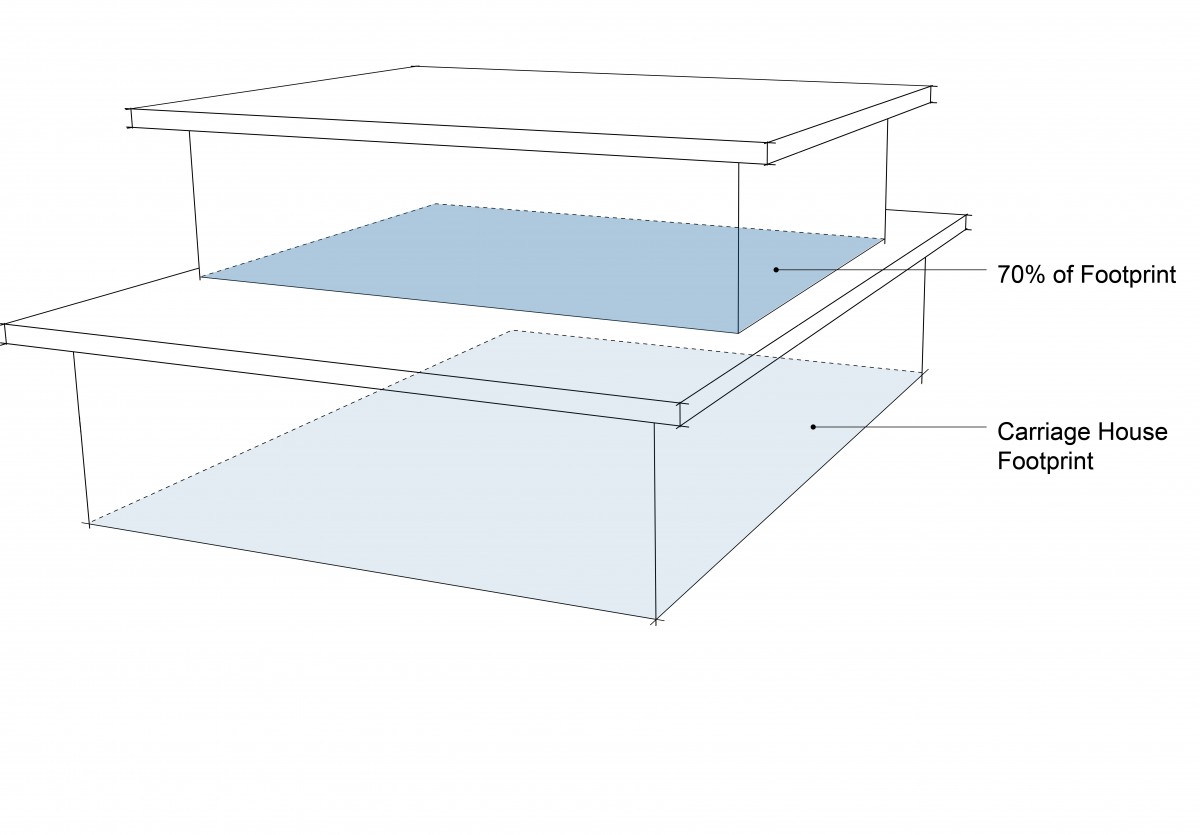 |
SECONDARY SUITE means a self-contained dwelling unit located within a building or portion of building. The secondary suite shall:
- be fully compliant with the BC Building Code at the time of construction;
- completely separated from other parts of the building by fire separations;
- located in a building of only residential occupancy;
- have an issued Occupancy Permit;
- located within a single detached dwelling, a semi-detached unit, a duplex unit, or a townhouse unit (secondary suites cannot be located in an apartment housing, or a boarding or lodging house);
- located in a building or portion of a building that is a single real estate entity; and
- located on a lot serviced with community water.
The secondary suite and principal dwelling are not required to be interconnected through a conditioned doorway. Short-term rental accommodations, bed & breakfast homes, boarding or lodging homes, and group homes, shall not be permitted to operate within a secondary suite.
SEMI-DETACHED HOUSING means a building containing dwelling units connected above finished grade and designed exclusively to accommodate two households living independently in separate dwellings side by side, each having a separate entrance at, or near, finished grade. The dwelling units in a semi-detached housing form must share a wall. Connecting the foundations below finished grade is not sufficient to be classified as a semi-detached housing form.
SEWER SYSTEM, COMMUNITY means a sanitary sewer or a system of sewage disposal works which is owned, operated and maintained by the City or an Improvement District.
SEWER SYSTEM, PRIVATE means a sanitary system or a system of sewage disposal works which is owned or, operated and maintained by a person other than the City, but does not include conventional septic tank systems within the meaning of Sewerage System Regulation under the Public Health Act.
SHOPPING CENTRE means one or more buildings containing more than six retail stores and other businesses exceeding 2,500 metres² of gross floor area which share common services, parking, and other facilities on one or more lots.
SHORT-TERM BICYCLE PARKING means bicycle parking that is provided for patrons, customers, and visitors of a development in a manner that is convenient and readily accessible for bicycles to park. Short-term parking of bicycles should serve the main entrance of a building and should be visible to pedestrians and bicyclists.
SHORT-TERM RENTAL ACCOMMODATION means the use of a dwelling unit or one or more sleeping units within a dwelling unit for temporary overnight accommodation for a period of time of less than 90 consecutive days. This use excludes hotels and motels. Short-term rental accommodations shall not be permitted to operate within a boarding or lodging house, a carriage house, a group home, or within a secondary suite.
SINGLE DETACHED DWELLING means a detached building containing only one dwelling unit, designed exclusively for occupancy by one household. Where a secondary suite is permitted, this use class may contain a secondary suite. This use includes modular homes that exceeds a 5.0 metre building width, but not a mobile home.
SITE means an area of land consisting of a lot or two or more abutting lots.
SITE COVERAGE means the percentage of the total horizontal area of a lot or lots that may be built upon including accessory buildings or structures (including carports and covered patios which are 23 square metres or larger) except it does not include steps, eaves, cornices, cantilevered balconies, pergolas, or similar projections permitted by this Bylaw. Site coverage also does not include swimming pools but swimming pools are an impermeable surface.
SLEEPING UNIT means a habitable room that may or may not be equipped with self-contained cooking facilities (i.e. a partial or full kitchen), which provides accommodation for guests.
SOFT LANDSCAPING means soil-based groundcover within the landscape area, including landscaping with a minimum 150mm of growing medium and plants including natural turf, ground covers such as perennials and grasses, shrubs and trees. Soft landscaping does not include areas without growing medium and plant materials such as areas that are predominately rock, artificial turf, rubberized surfacing or hard surfacing such as but not limited to pavers.
SOIL-BASED LANDSCAPING is landscaping, including turf, shrubs, and trees, that is supported by growing medium that meets the CSLA/CNLA Standard, does not include rock mulch or hard surface treatments, including permeable pavers.
See Table 7.2 for specific regulations and Figure 7.2.1 for visual example of soil-based landscaping.
SOIL VOLUME means the growing medium material that plants grow in. The growing medium shall follow the standards identified in the Canadian Landscape Standard (CLS).
SPECTATOR ENTERTAINMENT ESTABLISHMENTS mean an enclosed building designed specifically for the presentation of live artistic performances or the showing of motion pictures. Typical uses include but are not limited to auditoria, cinemas, theatres, and concert halls. This use falls within cultural and recreation services.
SPECTATOR SPORTS ESTABLISHMENTS mean facilities intended for sports and athletic events which are held primarily for public entertainment, where patrons attend on a recurring basis. Typical uses include but are not limited to stadiums, arenas, animal, and vehicle racing tracks.
STABLES means a building with a maximum of 40 permanent horse housing units used for horse riding, training, and boarding.
STACKED TOWNHOUSES means townhouses, except that two dwelling(s) are arranged vertically so that dwelling(s) may be placed wholly or partially over the other dwelling. Each dwelling will have an individual access to outside, not necessarily at finished grade, provided that no more than two units share a corridor, steps, or path.
STEPBACK means the horizontal recessing of the building facade, measured from the face of the building wall, above a specified storey. Common stairwells, elevators, and the associated common floor areas that access the stairwells and elevators are exempt from requiring to meet the stepback. Eaves can project into the stepback no greater than 0.6 meters. See illustrative figures for visual representation below:
| Figure 5.10(a) - Stepback Cross Section |
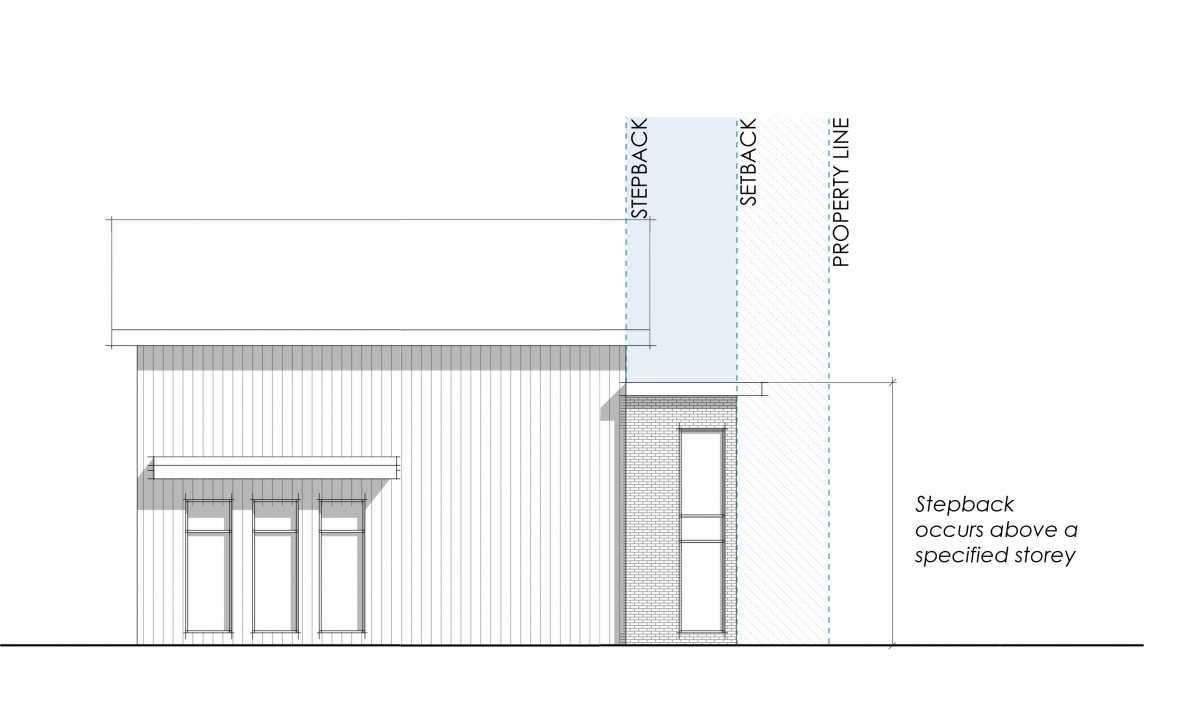 |
| Figure 5.10(b) - Stepback: Single Detached Housing |
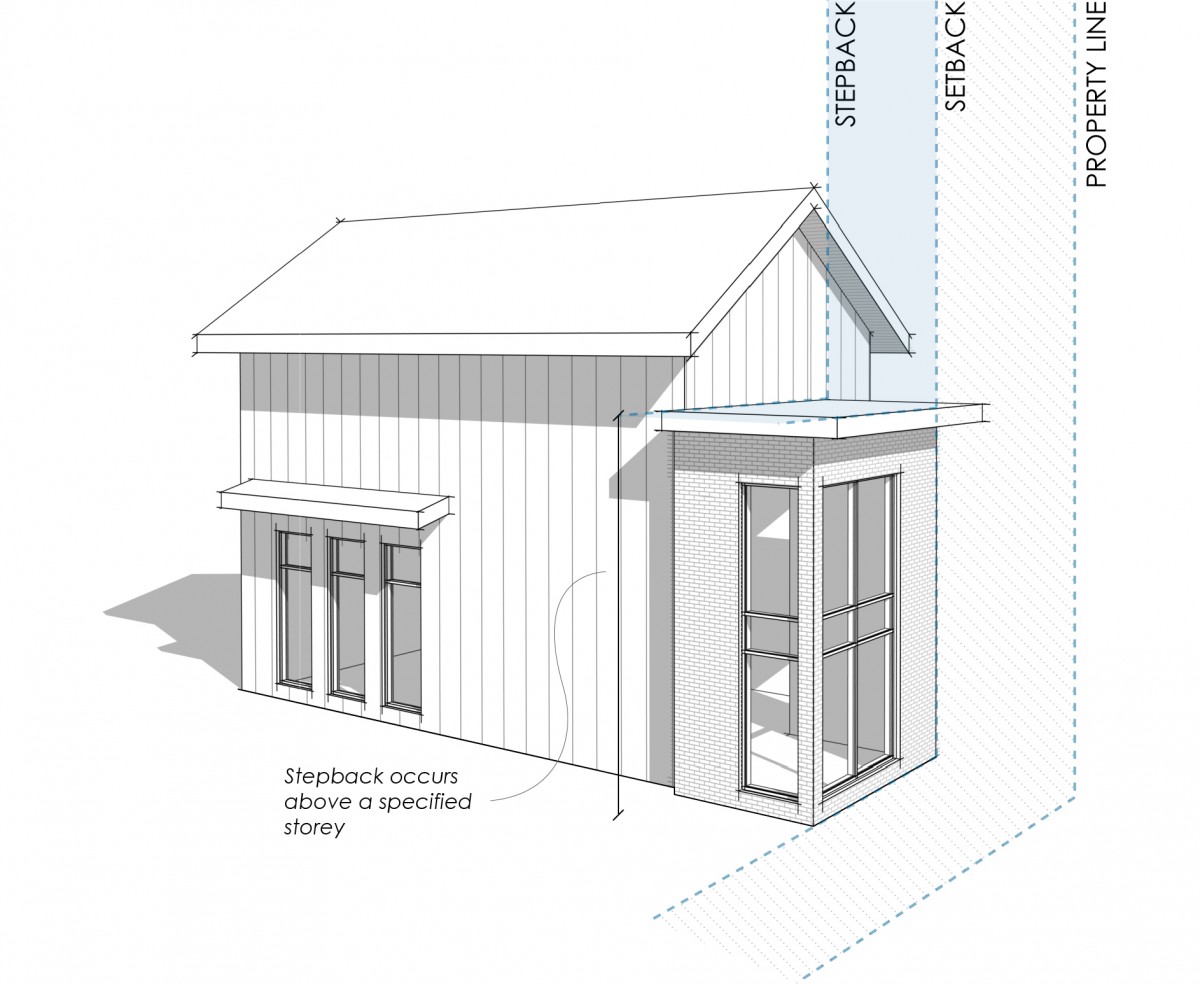 |
| Figure 5.10(c) - Stepback: Apartment |
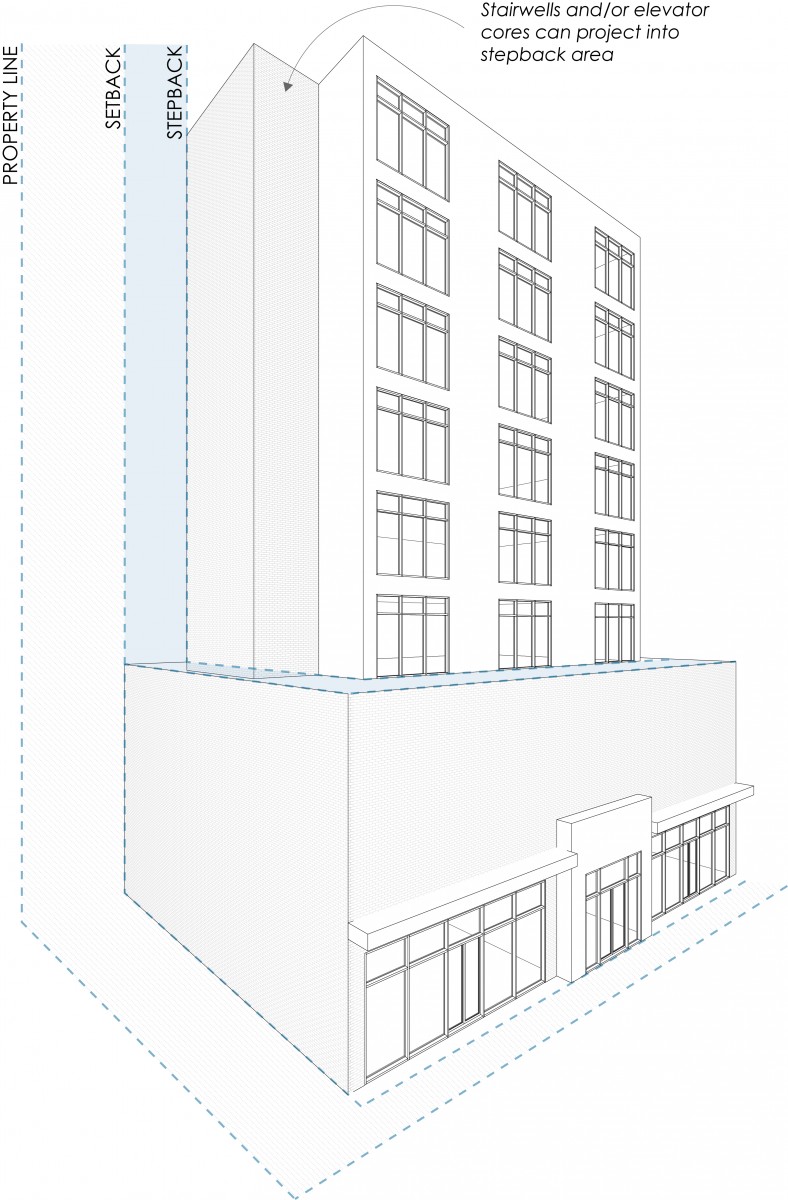 |
STOREY means that portion of a building which is situated between the top of any floor and the top of the floor next above it, and if there is no floor above it, that portion between the top of such floor and the ceiling above it. Any portion of building (including parkades) having its ceiling level 2.0 metres or less above finished grade will not be counted as storey. Mezzanines will not count as a storey.
STREET means a highway under the Local Government Act over 8.0 metres in width which affords the principal access to abutting properties. It can include a thoroughfare, street, trail, avenue, parkway, driveway, highway, road, viaduct, alley, bridge, trestle way, or other public right of way which is ordinarily used for vehicular traffic, parking, and pedestrians and is located on publicly owned lands. It includes sidewalks, curbs, boulevards, ditches, and traffic lanes.
STREET, FLANKING means a street which abuts a side lot line.
STRUCTURAL ALTERATION means any change or addition to the supporting members of a structure, including but not necessarily limited to the foundation, bearing walls, rafters, columns, beams or girders where the total value of the change or alteration does not exceed 75% of the assessed value of the existing structure. Changes or additions exceeding 75% of the assessed value of the existing structure are considered a new structure.
STRUCTURE means a construction of any kind whether fixed to or supported by or sunk into land or water including but not limited to towers, flag poles, swimming pools, docks, signs and tanks, and excludes areas of hard surfacing such as concrete, brick or unit pavers, turfstone, asphalt or similar materials.
STUDIO means a dwelling unit in which the sleeping and living areas are combined and which is not reasonably capable of being developed as a dwelling unit containing a separate bedroom or bedrooms.
SUBDIVISION means the division of a parcel by an instrument; including a strata plan, the consolidation of, or boundary change to, two or more adjoining parcels; and subdivide has a corresponding meaning.
SUPPORTIVE HOUSING means housing consisting of dwellings with support services on-site that may or may not include collective dining facilities, laundry facilities, counselling, educational services, homemaking, and transportation. Supportive housing can be in any apartment or townhouse building form. Supportive Housing can occur within a Single Detached Housing, Duplex Housing, or Semi-Detached Housing provided there are no more than 12 persons who are in care and that the housing is operated by a provincial agency. The layout of the home must remain a single housekeeping group and use a common kitchen.
SURVEYOR’S CERTIFICATE means a site plan certified by a registered British Columbia Land Surveyor showing the locations of improvements on a lot relative to the lot lines.
TANDEM PARKING means two parking spaces, one behind the other, with a common or shared point of access to a maneuvering aisle, lane or street.
TEMPORARY FARM WORKER(S) means an individual or individuals who carry out agricultural work on a temporary and seasonal basis on a farm unit.
TEMPORARY FARM WORKER HOUSING (TFWH) means a dwelling to temporarily accommodate temporary farm worker(s), which is accessory to a farm unit, that is used to provide space for cooking, sanitary, living and sleeping. Further regulations are described in Section 9.7 Specific Uses – Temporary Farm Worker Housing.
TEMPORARY FARM WORKER HOUSING (TFWH) FOOTPRINT means the portion of a lot that includes all structures, driveways and parking areas associated with the temporary farm worker housing, including but not limited to structures for cooking, sanitary, living and sleeping. The footprint does not include the vegetated buffer. Further regulations are described in Section 9.7 Specific Uses – Temporary Farm Worker Housing.
TEMPORARY SHELTER SERVICES means the provision of communal, transient accommodation sponsored or supervised by a public authority or non-profit agency intended to provide basic lodgings for persons requiring immediate shelter and assistance for a short period of time. This use includes an ancillary supportive housing use if the majority of the gross floor area is used for temporary shelter services. Typical uses include but are not limited to hostels and over-night shelters.
THIRD STOREY FLOOR AREA DIAGRAM (Figure 5.11) visually shows the meaning of the regulation:
| Figure 5.11 - Third Storey Floor Area Diagram |
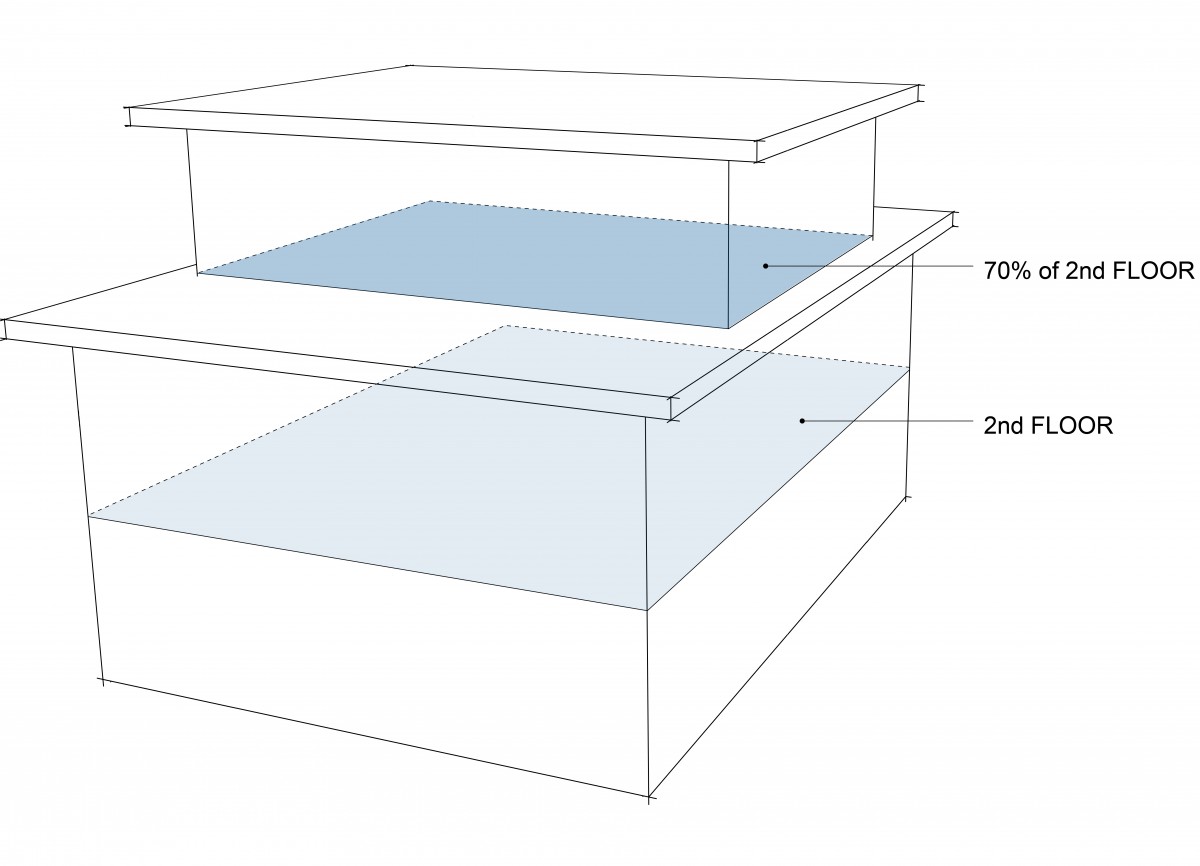 |
THRIFT STORES means any store or business operated by a registered non-profit society selling second-hand or used goods, the entire proceeds of which, above the actual bona-fide expenses, are devoted to any charitable purpose.
TRANSIT SUPPORTIVE CORRIDOR means any road identified as Transit Supportive Corridor within the 2040 Official Community Plan.
TOP OF BANK means the natural topographical break where elevation of land is at its peak. With the exception of Mission Creek, if the distance from the high-water mark to the toe of the slope is less than 15.0 meters, then setbacks are measured from the first significant and regular break in slope which is at least 15.0 meters wide. A break in the slope is defined as a section flatter than 3:1 for a minimum distance of 15.0 meters. Terraces less than 15.0 meters wide below the slope break shall be included in the leave strip area. Notwithstanding the foregoing, in the canyon areas of the Mission Creek stream corridor east of Mission Creek Regional Park, setbacks shall be measured from the canyon rim.
TOWNHOUSES means a building containing three or more dwelling units, which each having a direct entrance at grade. The Townhouse definition includes row housing. The townhouse land use includes any development configured as congregate housing or supportive housing.
URBAN CENTRE means those areas identified as a ‘Urban Centre’ within the mapping areas identified within the Official Community Plan.
URBAN SERVICES means the provision of utility infrastructure consisting of a community water system, a storm drainage system, a municipally provided sanitary sewer collection system, and paved roadways adjacent to the site.
USE means the purposes for which land or a building is arranged or intended, or for which either land, a building, or a structure is, or may be, occupied and maintained.
USE, ACCESSORY means a use which is normally ancillary, incidental, subordinate, and located on the same lot as the principal use. Parking may be an accessory use when it serves the principal use and does not serve uses on other sites. Accessory uses include recreational amenities in residential developments that are devoted to the exclusive use of residents living on the same site.
USE, PRINCIPAL means the main or primary use of land, buildings or structures which is provided for in the list of permitted uses in the zones of this Bylaw.
USE, SECONDARY means those uses in the lists of secondary uses in the zones of this Bylaw which must be in conjunction with a principal use. For example, a home-based business is a secondary use, not a principal use.
USED GOODS STORES means development used for the retail sale of second-hand or used major and minor household goods, including the refurbishing and repair of the goods being sold. Typical uses include but are not limited to the re-sale of items such as antique, used furniture, major appliances, and the resale of clothing, jewelry, stereos, and musical instruments. This does not include the sale of used vehicles, recreation craft or construction and industrial equipment, or auctioneering establishments.
UTILITY SERVICES, INFRASTRUCTURE means development for utility infrastructure purposes which is likely to have a major impact on adjacent uses by virtue of their potential emissions or effects, or their appearance. Typical uses include but are not limited to sanitary land fill sites, sewage treatment plants, water treatment plants, major pumphouses, water towers or tanks, sewage lagoons, snow dumping sites, sludge disposal beds, garbage transfer and compacting stations, power terminal and distributing stations, power generating stations, cooling plants, equipment and material storage yards for vehicles, utilities and services, district heating plants, incinerators, and waste recycling plants.
VEHICLE means any motor vehicle as defined in the Motor Vehicle Act.
VILLAGE CENTRE means those areas identified as a ‘Village Centre’ within the mapping areas identified within the Official Community Plan.
VISUAL EXAMPLES OF CORNER LOT SETBACK (Figure 9.11.1) means the following figure:
Figure 9.11.1 – Visual Examples of Corner Lot Setback |
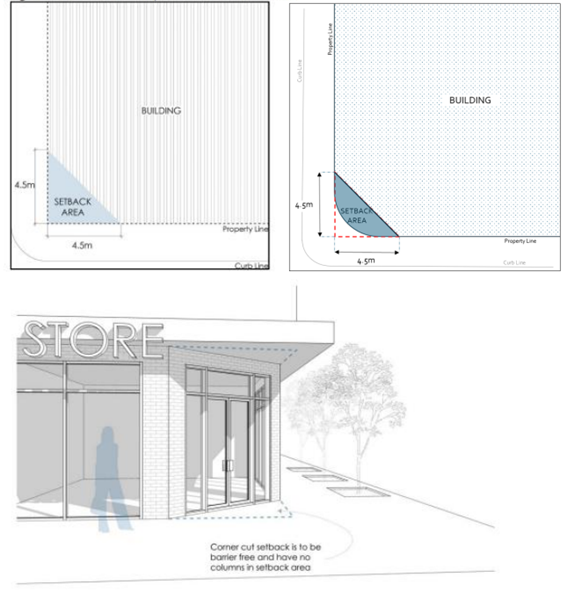 |
VISUAL EXAMPLE OF MAX FLOOR HEIGHT FOR REDUCED GROUND ORIENTED HOUSING SETBACK (Figure 5.12) means the following figure:
| Figure 5.12 - Visual Example of Max Floor Height for Reduced Ground Oriented Housing Setback |
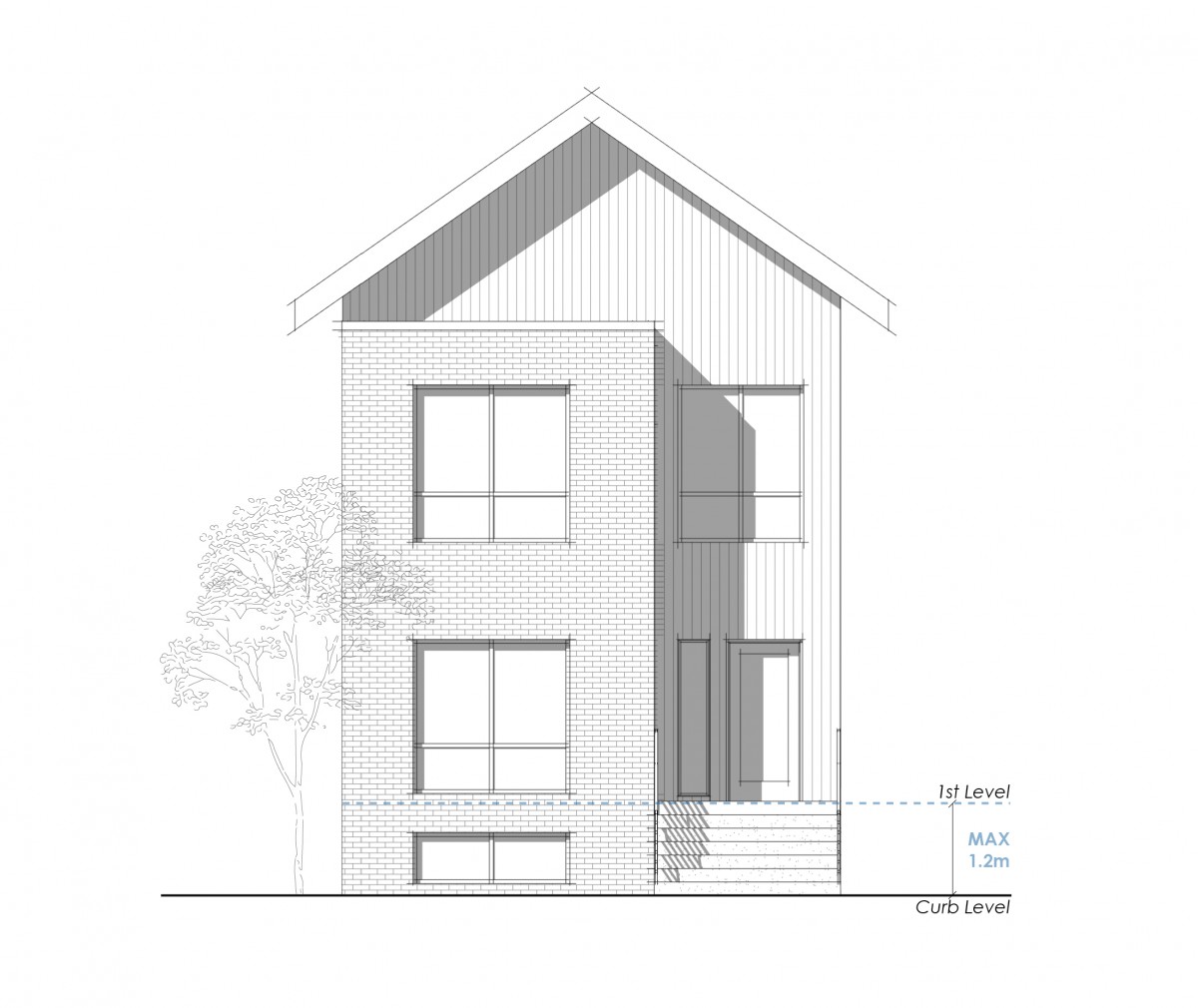 |
| Figure 5.13 - Visual Example of Min Net Floor Area on First Floor for Reduced Ground Oriented Housing Setback |
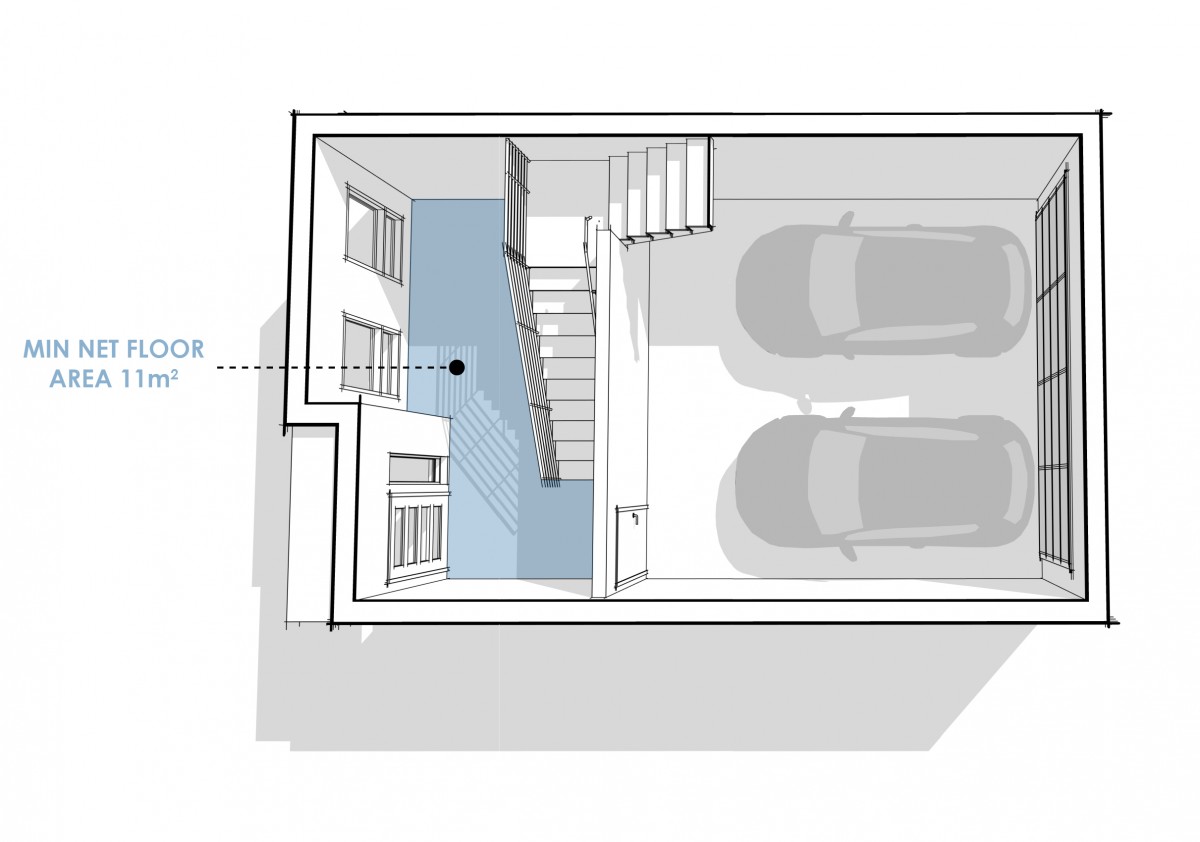 |
WAREHOUSING means development used to store products or goods before moving them to another location. In general, this land use does not include the retail sale of services or goods on-site. However, indoor display, office, technical, administrative support, e-commerce pickup locations, or retail sale operations can occur but shall limited in scale and be accessory to the warehousing listed above. The net floor area devoted to such accessory activities shall not exceed 10% or 235 square metres (whichever is less) of the gross floor area of the building(s) devoted to the warehousing. E-commerce locations that have consumer pickup is permitted as long as the warehousing portion is at least 90% of the gross floor area of the building and the gross floor area of the pickup location (including any retail portion) is not larger than 235 square metres.
WATER SYSTEM, COMMUNITY means a system of waterworks which includes either private or community waterworks, within the meaning of the Public Health Act which is owned, operated and maintained by the City, an Improvement District under the Water Utility Act and authorized by Council.
WATER SYSTEM, PRIVATE means a privately owned utility system certified as a public convenience and necessity under the Water Utility Act that provides water services to more than a single lot.
WATERCOURSE means any natural depression with visible banks, which contains water at some time, and includes any lake, river, stream, creek, spring, ravine, swamp, gulch, coulee, wetland, or surface source of water, whether containing fish or not, including intermittent streams, and drainage works which contain fish. Map 21.1 in the OCP illustrates the main lakes, rivers, creeks, and wetlands within the City of Kelowna.
WET BAR means a small facility that is used exclusively to prepare beverages or other items that do not require cooking. Exhaust fans, 220-volt wiring, natural gas rough-in and permanent cooking facilities of any type are not permitted. The provision of wet bars in no way permits an additional dwelling to be established.
WIDE LOTS are defined where the lot width exceeds the lot depth.
WRECKING YARD means any land or building used for the collection, demolition, dismantlement, storage, salvage, recycling, or sale of waste materials including scrap metal, vehicles, machinery, and other discarded materials.
YARD means an area created by a building setback from a lot line.
YARD, FRONT means the area between side lot lines extending from the front lot line to the nearest wall or supporting member of a building or structure.
YARD, REAR means the area between the side lot lines extending from the rear lot line to the nearest wall or supporting member of a building or structure.
YARD, SIDE means that part of the lot which extends from a front yard to the rear yard between the side lot line and the nearest wall or supporting member of a building or structure.
ZONE means the areas into which the City is divided in accordance with the maps attached as Schedule 'A' of this Bylaw and for which specific regulations are outlined herein for each area.




